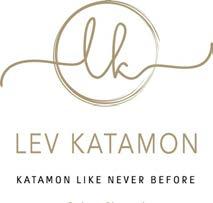



/ Maale Adumim 3:59
Aza area (Netivot, S’derot, Et al) 4:17
Beit Shemesh / RBS 4:18
5:16 4:00 5:19 4:18 5:18
5:17 4:18 5:16
5:16 4:16 5:15 Gush Etzion 4:15 5:16 4:15 5:15





/ Maale Adumim 3:59
Aza area (Netivot, S’derot, Et al) 4:17
Beit Shemesh / RBS 4:18
5:16 4:00 5:19 4:18 5:18
5:17 4:18 5:16
5:16 4:16 5:15 Gush Etzion 4:15 5:16 4:15 5:15
Ranges 11 days Wed - Shabbat
Nov. 30 - Dec. 10/ 6 - 16 Kislev
Earliest Tallit and Tefillin 5:26 - 5:33
Sunrise 6:20 - 6:28
Sof Zman Kriat Shema 8:54 - 9:00
Magen Avraham 8:15 - 8:21
Modi’in / Chashmona’im 4:15
Raanana/ Tel Mond/ Herzliya/ K. Saba 4:15 5:16 4:15 5:15
Netanya 4:15
Be’er Sheva 4:17
Rehovot 4:16
Petach Tikva 3:59
Ginot Shomron 4:14
Haifa / Zichron 4:03
Gush Shiloh 4:13
Tel Aviv / Giv’at Shmuel 4:16
Giv’at Ze’ev 4:14
Chevron / Kiryat Arba 4:15
Ashkelon 4:15
Yad Binyamin 4:16
Tzfat / Bik’at HaYarden 4:06
Golan 4:11
5:16 4:15 5:15
5:18 4:18 5:17
5:17 4:18 5:16
5:16 4:00 5:15
5:15 4:14 5:14
5:15 4:03 5:14
5:15 4:14 5:14
5:17 4:16 5:16
5:16 4:15 5:15
5:17 4:16 5:16
5:18 4:18 5:16
5:17 4:16 5:16
5:12 4:06 5:11
5:12 4:11 5:11
Rabbeinu Tam (J'lem) - 5:52PM • next week - 5:53pm
Sof Zman Tefila 9:45 - 9:50 (According to the Gra and Baal HaTanya)
Chatzot (Halachic Noon) 11:27 - 11:31
Mincha Gedola (Earliest Mincha) 11:57 - 12:01
Plag Mincha 3:30 - 3:32
(Including Elevation) 4:40
Seymour J. Abrams • Ortho dox Union Jerusalem World Center • Avrom Silver Jerusalem College for Adults • Wolinetz Family Shul • Makom BaLev • Birthright • Yachad • NCSY in Israel • JLIC in Israel • Pearl & Harold M. Jacobs ZULA Outreach Center • The Jack Gindi Oraita Program • OU Israel Kashrut
ZVI SAND, PRESIDENT, OU ISRAEL Yitzchak Fund, Former President, OU Israel Rabbi Emanuel Quint z”l, Senior Vice President | Prof. Meni Koslowsky, Vice President
VAAD MEMBERS: Dr. Michael Elman | Stuart Hershkowitz | Moshe Kempinski | Sandy Kestenbaum | Harvey Wolinetz
RABBI AVI BERMAN, EXECUTIVE DIRECTOR, OU ISRAEL
David Katz, CFO, OU Israel | Chaim Pelzner, Director of Programs, OU Israel | Rabbi Sam Shor, Director of Programs, OU Israel Center Rabbi Sholom Gold, Dean, Avrom Silver Jerusalem College for Adults 22 Keren HaYesod <> POB 37015 <> Jerusalem 91370


phone: (02) 560 9100 | fax: (02) 561-7432 email: office@ouisrael.org website: www.ouisrael.org Founders and initial benefactors of the OU Israel Center: George and Ilse Falk a"h
OU Israel, Torah Tidbits does not endorse the political or halachic positions of its editor, columnists or advertisers, nor guarantee the quality of advertised services or products. Nor do we endorse the kashrut of hotels, restaurants, caterers or food products that are advertised in TT (except, of course, those under OU-Israel hashgacha). Any "promises" made in ads are the sole responsibility of the advertisers and not that of OU Israel, the OU Israel Center , Torah Tidbits.
Earlier this week I received an email from one of our Torah Tidbits readers thank ing us for this publication. As he shared, “There is no politics, just ahavat Yisrael.” He went on to share that despite the positive stories I’ve shared about Israeli youth, the reality is quite difficult, and he asked that I address this issue.
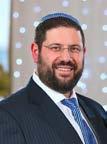
Over the years I have come to appreciate the vantage point I am able to have in my role at the OU which gives me a front row seat to witness the beauty of Am Yisrael. It is from this perspective that I write my column each week, expressing the appreciation I feel in my heart with the hope that it pro vides inspiration, hope and encouragement to readers. While it is true that the world can be grim and we have our work cut out for us, I make an effort to find moments of beauty – a value I learned years ago from my rebbe, Rav Mordechai Eliyahu z”tl. Rav Eliyahu taught me that a person has a choice in how they respond to situations in life. Those who respond with an attitude of “האלמ סוכ יצח,” a “cup half full,” are wise. This idea can be found in the rashei tevot of this very phrase, “האלמ סוכ יצח”, spelling the word “םכח.” After all, the concept of gratitude and positivity is woven into the fabric of every Jew as we begin each day with the words, “Modeh Ani Lefanecha.” Striving to live my life with this guiding value, I feel compelled to share moments
which demonstrate the beauty of Am Yis rael with readers. And while I could fill the pages of Torah Tidbits from cover to cover with our triumphs, perhaps what highlights our qualities as Bnei Yisrael best is our abil ity to see light within the darkness.
This past week Am Yisrael was once again devastated by two pigu’im that took the lives of Aryeh Shechopek, a 16-year-old Canadian oleh, and Tadasa Tashume Ben Ma’ada, a 50-year-old Ethiopian oleh who left behind a wife and six children. The attack impacted many, including some of OU Israel’s Bnot Sherut who were on their way to the Makom Balev OU Youth Center in Beit ShemeshNaomi, Shira and Hodayah.
Naomi is the daughter of my good friend, Rabbi Uri Pilichowski and his wife Aliza, and I had the zechut to speak with Naomi and Shira in my office this week. It was humbling to hear their reflections of what transpired. Notably, they spent much of our time together sharing the many nissim that took place which allowed them to be at a far enough distance from the explosion. Naomi and Shira are not alone in publiciz ing the Yad HaShem that was apparent on Wednesday morning. Countless articles and messages have been shared by those present whose lives have been spared, highlighting the miracle that took place at the Ramot Junction bus stop, in which the bomb detonated just seconds after a bus that was filled with passengers pulled away.
With the pain of the Shechopek and Ben
Ma’ada families weighing on my heart, I found myself spending late hours at the Zula this week. I simply couldn’t pull myself away. Teens swarmed the hall ways of the building, connecting with one another and their madrichim late into the night. Spending their time productively and out of harm’s way, I saw the beauty of Am Yisrael. Despite the late hour and the heavy hearts, staff members stayed with the teens, offering support, guidance and comfort.
When reflecting on what we’ve been able to build at the Zula, which is funded by donations from Jews within Israel and around the world, teens continue to find a place of refuge in which to grow. The Zula is just one of many reminders that when members of Am Yisrael are in need, distance is no object. However, with our successes thus far, there is still much work to be done and we are always in need of more resources to fill the gaps for teens looking for stability. In times when I feel overwhelmed by the magnitude of need that our youth face, I am comforted know ing that as members of Klal Yisrael, there will always be those willing to do their part to make this world – and our future – brighter.
This week, the Zula reminded me of the immense power of kindness, providing me with hope for the future of Am Yisrael. It was with this thought that I addressed the participants at our OU Israel Center annual Thanksgiving meal. As Klal Yisrael, we are an Am Levadad Yishkon, and within the borders of Eretz Yisrael we feel this verse acutely - especially in times of national sor row. Yet as I saw in the brimming hallways of
the Zula, the chessed of Klal Yisrael remains unchanged despite the world around us. If anything, it reaches new heights as we redouble our efforts in the merit of the neshamot tragically taken from us.

May HaKadosh Baruch Hu bless us with a week of peace, safety and healing. May the neshamot of Aryeh and Tadasa Tashume have an aliyah in Shamayim, and those injured have a refuah shelaima. May we find the strength to see the world around us with a “האלמ סוכ יצח” and experience the Yad HaShem in our lives.
Wishing you all an uplifting and inspiring Shabbat, Rabbi Avi Berman Executive Director, OU Israel aberman@ouisrael.org

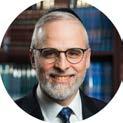

All of us occasionally find ourselves in situations where we may need to offer constructive criticism. Yet, effective and constructive criticism is an art form. Indeed, the Talmud (Eruchin 16b) notes that Rabbi Tarfon expressed doubt that any one of his contemporaries could properly accept criticism, while Rabbi Elazar ben Azarya questioned if anyone could deliver criticism respectfully and without generat ing shame (see Rashi there).
It is therefore noteworthy how in our Par sha (29:4) the usually reticent Yaakov Avinu arrives in Charan, meets several of the locals and almost immediately begins to criticize them for their work ethic. Even stranger, they seem to have no problem with it at all. How did Yaakov accomplish this?
One of the great post-Holocaust rebuild ers of Judaism was Rabbi Yosef Shlomo Kahaneman, zt”l, the Ponevezher Rav. He was passionately dedicated to rebuilding in Israel the destroyed yeshivas of Lithuania, seeing it as his mission and as the charge he had received from his saintly teacher, the Chafetz Chaim. Remarkably, he earned the love and admiration of the broader Israeli
leadership and society while serving as one of the chief architects of the emerging Haredi world.
The Rav highlighted that when Yaakov addressed the locals, he opened with one critical word, achai, “my brothers.” Yaakov was able to convey a true and genuine feel ing of care and kinship that enabled him to address the other constructively.
For the Ponevezher Rav this was not just a thought on the Parsha. He would invariably begin his public speeches and private conversations in the way of Yaakov, achim yekarim, mein ty’ere breiderlach, “my dear brothers….” He succeeded in conveying his respect and love for others, and they saw that it was genuine, opening the door to real communication and connection.
This is a model for all of us to emulate in our personal, professional, and communal relationships.
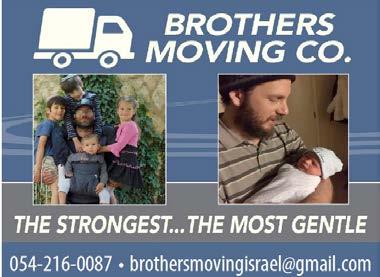







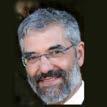
Our parsha begins with Yaakov fleeing the Land of Israel from Esav’s murderous intent and it concludes with his return to the Land of Israel. As he leaves, he dreams of a ladder reaching to Heaven with G-d promising that He will bring Yaakov back in peace. Yaakov meets Rachel at the well in Charan, marries Leah and Rachel, 11 of the 12 sons and Dina are born. Lavan and Yaakov bicker. Yaakov earns his wages through animal husbandry. Angels greet Yaakov on his return to Israel.
1st Aliya (28:10-22) Yaakov flees the Land of Israel. He dreams: a ladder with angels, G-d at the top. G-d reiterates to Yaakov the promise of the Land of Israel and of numerous descen dants. And that He will protect Yaakov and
bring him back to the Land. Yaakov makes a monument at that spot and declares that upon his safe return he will come back and make this spot a house of G-d.
One of the great dreams of the Torah. In fact, the first dream of an upcoming series of dreams in the Torah: Yosef’s dream, Paro’s dream. In this dream Yaakov is assured of Divine protection. But why did he need this assurance? What was on his mind?
Let’s place ourselves in Yaakov’s sandals. He does not know the end of the story. We do but he doesn’t. He is filled with uncer tainty. Avraham had 2 children: Yishmael and Yitzchak. One, Yitzchak continued Avraham’s legacy as a Jew. The other, Yishmael, was out. Then Yitzchak had 2 children, me and my brother Esav. Maybe we too will repeat this same pattern: one will be in and one will be out. Who is the one – am I in or am I out? I stole the blessing intended for Esav, my brother. Perhaps my fleeing Israel now is a Divine sign that I am out and Esav is in. After all, my father Yitzchak never left the Land. So am I being expelled from the Land, expelled from the promise of the Land? G-d reassures him – I will give you the Land and bring you back. But. In a dream. Are dreams real or wishful thinking?
Los Angeles, California Torah Tidbits regrets the misinformation that appeared in last week’s issue and wishes Rabbi Yaakov Zev
2nd Aliya (29:1-17) Yaakov arrives in Charan. He con verses with shepherds at the well. They are waiting for a crowd of them to remove the stone over the well. He inquires of Lavan; that is Rachel, daughter of Lavan, coming now. Yaakov removes the heavy stone of the well, gives Rachel water. He tells her he is Rivka’s son. Rachel runs to tell her father, Lavan runs to greet Yaa kov. Yaakov stays with them for a month.
If Yaakov is looking for a sign that G-d is with him, he got it. There are so many par allels to Eliezer finding Rivka at the well. Except in reverse. Rivka drew the water for Eliezer and his camels; Yaakov removes the stone and gets water for Rachel and her animals. Eliezer asked Rivka who she was; Yaakov tells Rachel who he is. Rivka ran home to her mother; Rachel runs home to her father. Lavan ran out to greet Eliezer; and Lavan runs out to greet Yaakov. Eliezer was seeking a wife for Yitzchak and return ing to Israel; Yaakov is seeking family but not leaving.
but you could possibly do them. For when it comes to communications from G-d, you are unique, irreplaceable, sui generis, one of a kind.





3rd Aliya (29:18-30:13) Yaakov loves Rachel. In response to Lavan asking how he can com pensate Yaakov, Yaakov offers to work 7 years to marry Rachel. At the end of that time, Lavan makes a celebration. He gives Leah to Yaakov. In the morning Yaakov realizes. Lavan remarks that here we don’t switch younger and older. Yaakov marries Rachel and works another 7 years. Leah has 4 children: Reuven, Shimon, Levi, Yehuda. Rachel is upset, as she is barren. She gives Yaakov Bilhah, her maidservant. She has Dan and Naphtali. Zilpah, Leah’s maidservant has Gad and Asher. Let’s get back in Yaakov’s sandals. He still
This exchange presents a fundamental principle of the Torah: that G-d speaks to Moshe in a way that He does not, nor will He in the future ever do again with anyone else. When Moshe says that people come to him seeking G-d, what he means is: I have access to G-d. He speaks to me. (Speaking to G-d isn’t the trick; the trick is when He answers back.) Similarly, when Moshe says that he teaches G-d’s law, what he means is that G-d communicates those laws to him and to no one else. This could very well be the prime purpose of this Yitro story. For, in the very next story, the giving of the Torah, the very same theme of Moshe’s uniqueness as the one to whom G-d speaks is central.

3rd aliya (18:24-27) Moshe heard. He chose judges, with only the most difficult cases brought to him. Moshe sent Yitro home. It takes an honest leader to accept suggestions to improve. Moshe displays his honesty and humility – if the suggestion is good, embrace it. Just as Yitro accepted the news of the Exodus and affirmed One G-d,
Keren Malki empowers families of children with special needs in Israel to choose home care. Donations are tax-approved in Israel, US and UK.
Honoring the memory of Malka Chana Roth ד”יה 1985-2001, killed in the Sbarro bombing.

wonders if he is part of the Jewish people or has been spurned – was that dream of Divine protection prophetic or mere wish ful? He is tricked at night when it is hard to see and marries Leah. Is this a sign from G-d of displeasure at Yaakov tricking his father who could not see to get the bra cha? Maybe I am out. On the other hand, my dear wife Rachel seems to follow in my grandmother Sarah’s footsteps; she is bar ren and gives her servant to me to have a child, just like Sarah was barren and gave Hagar to Avraham to have a child.
4th Aliya (30:14-27) Reuven brings jasmine, a fertility enhancer to Leah. Rachel asks for it and in exchange Leah conceives and has Yissachar, followed by Zevulun. Rachel bears Yosef. Yaakov asks Lavan permission to return home.
11 of the sons of Yaakov and his daughter Dina have been born. There is but one son from his dear wife Rachel. If we get back in Yaakov’s shoes, he does not know if he is to be in the Jewish people or not. Because another thing may sit uncomfortably with him. Avraham was the first generation of the Jewish people. While he was in, his brother Nachor was out. Back at the end of Vayera (22:20-14), we learn that Nachor had 8 sons with his wife Milka and 4 with his concubine Reuma. 12 sons. And at the end of Chayei Sarah (25:12-15), we learn of the chil dren of Yishmael, the one who is out of the Jewish people. 12 sons. Hmm, the ones who are out of the Jewish people, Nachor, Avra ham’s brother, and Yishmael, Yitzchak’s brother, had 12 sons. I have 11. On the other hand, all my children are walking in the footsteps of Avraham, leaving their land
of Charan and journeying to Israel. Which sign is it? Am I in or out?
5th Aliya (30:28-31:16) Lavan asks Yaakov what his wage is for all the work he has done. Yaakov asks that he be allowed to select and breed certain animals as his wage. He is wildly successful and becomes laden with livestock. Lavan’s sons become jealous. Yaakov knows it is time to leave. He care fully explains to Rachel and Leah that he is worried as Lavan has not been honest with him. And that the angel has told him it is time to return to the Land. They agree that whatever G-d says they must do.
Yaakov creates enormous wealth. Per haps this is a Divine sign: Avraham had great wealth, Yitzchak was blessed with “meah shearim”, a 100-fold bounty of agri culture. Yaakov too has been unusually blessed in his breeding of flocks. Perhaps this is a Divine sign that I walk in my fore father’s footsteps.
6th Aliya (31:17-42) Yaakov and the family leave without telling Lavan. Rachel steals Lavan’s idols. Lavan pursues. G-d tells him not to harm Yaakov. Lavan berates Yaakov for his deception, not allowing him to kiss his chil dren. Were it not that G-d instructed him otherwise, he would be justified in harm ing Yaakov. He searches for his idols but does not find them. Yaakov is fed up. He berates Lavan for his lack of appreciation of all of Yaakov’s hard work, changing his wages 10 times. But G-d saw my oppressive work and rewarded me.
One last look from Yaakov’s shoes. He still is unsure whether he is part of the cov enant or not. But another prediction rings
in his ears. Years earlier Avraham was told his children would be in a foreign land and afflicted, the Hebrew word “eenu”. For 400 years. And would return with great wealth. Yaakov uses that very word to describe his hard work for Lavan “G-d saw my hard labour – an’ee”. Perhaps, Yaakov wonders, I am that Jewish people. Foreign land. Afflicted. I am here 20 years, a long time –seems like 400. Leaving with great wealth.


Yaakov’s sees signs in his life that point to his being the next link in the Jewish people. On the other hand, he sees signs that per haps he is the one that is out and Esav in. But the scale is clearly weighing in his favor.
7th Aliya (31:43-32:3) Lavan and Yaakov part amidst a parting ceremony. A marker and stones are placed as testimony that Lavan will not approach Yaakov, nor Yaakov approach Lavan. Lavan returns home. Angels encounter Yaakov as he returns to the Land.
The break with Lavan is complete. Pacts come in different shapes and sizes. If you get in trouble, I will come to help. Or, we will open our borders to com merce. Or. A wall. A cold peace. You, on your side. I on mine. Kind of like the mitzvah to never return to Egypt. Years of decep tion, of toil, of suspicion. That chapter is closed.
The angels greet him. Angels when he left and angels when he returns.

HOSHEA 11:7-12:14.

This week’s haftorah makes
BY RABBI Rav, Beitdirect mention of Yaakov’s flight from home to the “field of Aram,” which is a crit ical episode recounted in this week’s Torah reading.
The haftorah states Hoshea’s rebuke of the Jewish people for their sin of forsak ing Hashem. However, Hoshea assures the people that Hashem will not abandon them: “How can I give you, Ephraim, and deliver you [to the hands of the nations]? . . . I will not act with My fierce anger; I will not return to destroy Ephraim.”
The haftorah proceeds to discuss the transgressions of the Northern Kingdom of Israel, and the future demise of the Kingdom of Judea. The navi makes a comparison between this generation and the behavior of their forefather Yaakov who was faithful and dedicated to God and prevailed against
his enemies.
The haftorah optimistically highlights the eventual ingathering of the exiles which will occur at the Final Redemption: “They shall hasten like a bird from Egypt and like a dove from the land of Assyria; and I will place them in their houses, says the Lord.”
7th of 54 sedras; 7th of 12 in B’reishit Written on 235.3 lines, ranks 12th Vayeitzei is one single very long (closed) Parsha. It’s being a S’TUMA fits with the fact that it is a continuation of the To-l’dot story. It is the Torah’s longest closed parsha, and second only to the open parsha that is all of Mikeitz (254.6 lines) 148 p’sukim - rank: 6th (3rd in B’reishit) 2021 words - rank: 4th (3rd in B’reishit) 7512 letters - rank: 5th (3rd in B’reishit)
None of the 613 mitzvot are in Vayeitzei This is one of 17 mitzva-less sedras, 9 of which are in Sefer B’reishit, 3 in Sh’mot, none in Vayikra, 2 in Bamidbar, and 3 in D’varim.
As Yaakov is dreaming, G-d appears to him and blesses him. As G-d concludes his blessing, He says: (וט:חכ)
“And behold, I am with you, and will keep you wherever you go, and will bring you back into this land; for I will not leave you.” (28:15)
The Sages of the Midrash point out that G-d responded in affirmative to all of Yaakov’s requests with the exception of his request for sustenance. (BR 69). How could G-d ignore this basic request from Yaakov fleeing from his home?
The Dubno Magid (1741-1804) answers through a parable, in his Sefer “Ohel Yaakov”. There was once a man who sent his son away to a distant land. He prepared all the necessary provisions for his son’s travels including all the money needed for his expenses. Before the son began his journey, his father received word of impending dangers on the roads he plans to take. The father immediately decides to accompany his son on his journey to protect him from any obstacles on the way. As they began the journey together, the son asked his father how much money did the father allocate to his son for the trip. Whereas the father responded, now that I am with you and taking care of you, what is your need for money?
Similarly, here, perhaps Yaakov had a need to request sustenance but now that G-d assured him that “I will not leave you”, there is no longer the need for G-d to address this issue. Shabbat Shalom





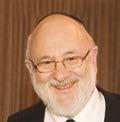
How do you define “maturity”? The dictionary definition asserts that it is a state of being full-grown, ripe, or fully developed. But I think that the common man gives a subjective definition to maturity in one of two other ways.


















Maturity, depending upon whether one tends to be idealistic or leans toward cyn icism, seems to carry one of the following meanings:
Either one takes the position that matu rity is associated with the wisdom gained from experience over time. From this point of view, the mature person is one who has learned from all that has happened to him and has developed, if not an infallible system that answers all questions, then at least an approach to life which is practical,
informed, and wise.
Or, one takes the position that maturity is the state reached when one realizes that his childhood dreams were just that: dreams, and no more. One who is mature has learned to abandon youthful ideals, surren der impractical hopes and plans, and settle for reality and its limitations.
Which definition of maturity is yours, dear reader? Is maturity associated with wisdom? Or is the mature person the one who has learned to live a practical and cautious life, without ideals and utopian dreams?
In this week’s Torah portion, Parshat Vay etze (Genesis 28:10-32:32:3), we have the opportunity to read about the maturation of our Patriarch, Jacob. The portion begins with a dream, a sublime dream. Toward the middle of the portion, Jacob dreams again, this time a very businesslike, down-to-earth, practical dream.
Jacob’s first dream, the sublime one,
been memorialized in a popular song, "An eternal people does not fear the long and arduous path."
be in loving memory and נ"על our dear parents whose yahrtzeits are in Kislev


Doris Weinberger a"h

ולסכ 'ד -ה"ע המלש לאקזחי תב האל הרובד
Max Weinberger z”l
ולסכ ז"כ -ל"ז בד ןב ךלמילא
envisions a ladder firmly rooted into the earth but extending heavenwards. However one interprets it, and creative interpreta tions abound, it is a majestic glimpse of infinite possibilities, of ideals of immense significance. If anything, it is a grand imag inative symbol of the relationship between man and God, and of the former’s potential to connect with the latter.
Greatly missed by their children, grandchildren and great grandchildren
Rav Aryeh and Dvora Weinberger Bernie and Leah Weinberger Menachem and Hannah Katten
Patience is necessary for those who follow Isaac's way. But a wise woman taught us that patience is but another name for hope. That woman was Jane Austen, who put these words into the mouth of one of the characters in her great novel, Sense and Sensibility: "Know your own happiness. You want nothing but patience—or give it a more fascinating name: call it hope."
In observance of the Shloshim of
But then, Jacob spends his years working for his uncle, Laban. He is busy with mun dane affairs; in his own words, “scorched by heat all day, and freezing at night.” He is busy, nay preoccupied, with business affairs, with profit, with practical material matters.
And he dreams again. But the second time, his dream is far from sublime. He sees that “the he-goats mating with the flock were streaked, speckled, and mottled.” Things are going his way in the world of sheep-raising. Every trace of another higher world is missing.
If Jacob’s second dream would end at this point, we could say that he matured in the second, cynical, sense. His initial dream was a lofty one; his subsequent dream, a comedown. His vision was diminished, from a glimpse of Heaven to earthly things.
But his second dream does not end with
his vision of goats, speckled or otherwise. Rather, an angel appears to him and says that he, the angel, has observed Jacob’s dream and has “noted all that Laban has been doing to you.” The angel in the dream is the better part of Jacob himself, the part that realizes that Laban’s environment has contaminated his dreams.

The angel in the dream then goes on to say that he represents the God of Bethel and that it is time for Jacob to “leave this land and return to his native land.” It is time for him to become mature in the first sense. It is time for him to reclaim his first dream and to do all that he can to make that dream real.




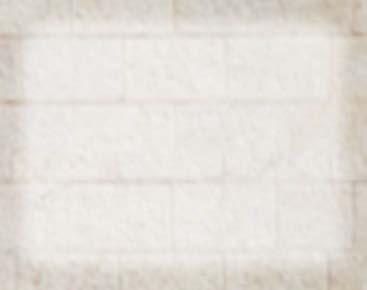


Jacob reaches true maturity when he decides not to yield to the temptation to compromise upon his original dream. When he realizes that his dreams are not what they once were and that he has lost his youthful vision of a ladder connecting heaven and earth, he does not merely settle for his new reality.
Rather, he learns, and this lesson is
imparted to him by God Himself, that one must not surrender to mundane dreams, abandoning old ideals. He learns that he can return to the dream of his youth. And he learns not only that he can go home again, but that he must go home again.
There is, of course, another lesson that he learns, and this is an eternal lesson for the Jewish people. The dreams of our national youth, the visions of our biblical heroes and of the Patriarchs and Matriarchs, can only be achieved in the Land of Israel. The dreams of the Diaspora are apt to be mundane, short sighted, and a bit selfish. The dreams of the Land of Israel are noble dreams, exalted dreams, and dreams which ultimately con nect us to heaven. Indeed, the dreams of Israel ideally connect all of the earth’s inhab itants to their Father in Heaven.

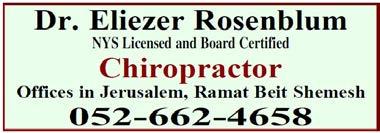



We can revisit the dreams of our youth. We can go home again. The Land of Israel is the land of our dreams, and it is home. This is one lesson learned from this week’s Torah portion: a lesson about being a Jew, and a lesson about true maturity.
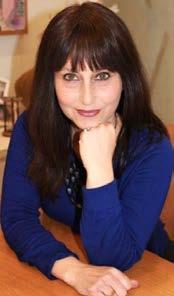
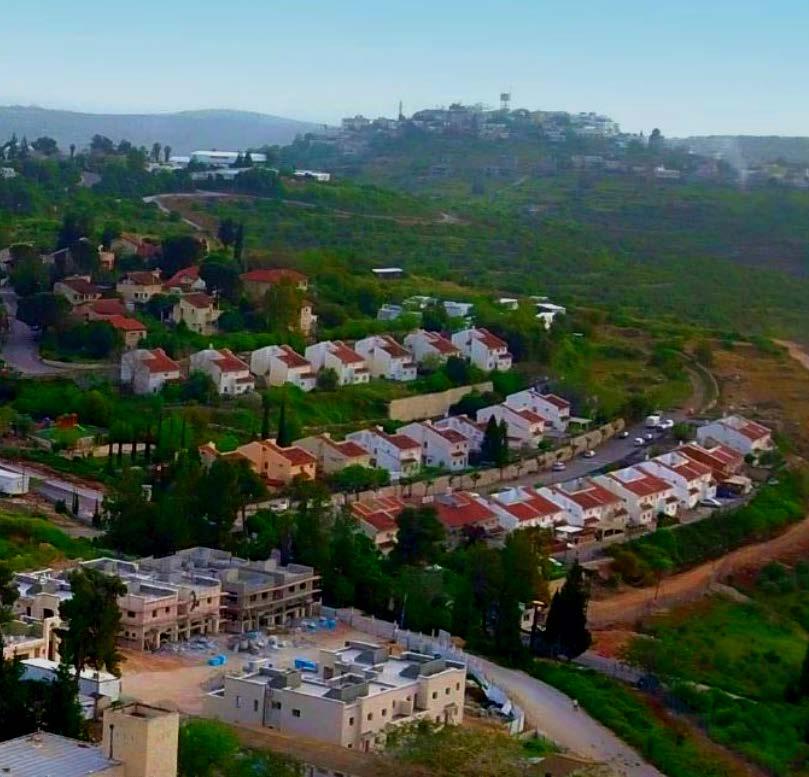


Why Jacob? That is the question we find ourselves asking repeatedly as we read the narratives of Genesis. Jacob is not what Noah was: righteous, perfect in his gener ations, one who walked with God. He did not, like Abraham, leave his land, his birth place, and his father’s house in response to a divine call. He did not, like Isaac, offer himself up as a sacrifice. Nor did he have the burning sense of justice and willingness to intervene that we see in the vignettes of Moses’ early life. Yet we are defined for all time as the descendants of Jacob, the children of Israel. Hence the force of the question: Why Jacob?
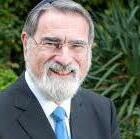
The answer, it seems to me, is intimated in the beginning of this parsha. Jacob was in the middle of a journey from one danger to another. He had left home because Esau had vowed to kill him when Isaac died. He was about to enter the household of his
uncle Laban, which would itself present other dangers. Far from home, alone, he was at a point of maximum vulnerability. The sun set. Night fell. Jacob lay down to sleep, and then saw this majestic vision: He dreamed and, look, there was a ladder set on the earth, with its top reaching heaven; and look, angels of God were ascending and descending on it. And look, the Lord stood beside him and said, “I am the Lord, the God of Abraham your father and the God of Isaac; the land on which you lie I will give to you and to your offspring; and your off spring shall be like the dust of the earth, and you shall spread forth to the west and to the east and to the north and to the south; and all the families of the earth shall be blessed through you and through your offspring. And look, I am with you and will keep you wherever you go, and will bring you back to this land; for I will not leave you until I have done what I have promised you.” Then Jacob woke from his sleep and said, “Surely the Lord is in this place – and I did not know it!” And he was afraid, and said, “How awe some is this place! This is none other than the house of God, and this is the gate of heaven.” (Gen. 28:12–17)
Note the fourfold “and look,” in Hebrew vehinei, an expression of surprise. Nothing has prepared Jacob for this encounter, a
point emphasized in his own words when he says, “the Lord is in this place – and I did not know it.” The very verb used at the beginning of the passage, “He came upon a place,” in Hebrew vayifga bamakom, also means an unexpected encounter. Later, in rabbinic Hebrew, the word haMakom, “the Place,” came to mean “God.” Hence in a poetic way the phrase vayifga bamakom could be read as, “Jacob happened on, had an unexpected encounter with, God.”

Add to this Jacob’s night-time wrestling match with the angel in the following parsha and we have an answer to our ques tion. Jacob is the man who has his deepest spiritual experiences alone, at night, in the face of danger and far from home. He is the man who meets God when he least expects to, when his mind is on other things, when he is in a state of fear, and possibly on the brink of despair. Jacob is the man who, in liminal space, in the middle of the journey, discovers that “surely the Lord is in this place – and I did not know it!”
Jacob thus became the father of the peo ple who had their closest encounter with God in what Moses was later to describe as “the howling wasteland of a wilderness” (Deut. 32:10). Uniquely, Jews survived a whole series of exiles, and though at first they said, “How can we sing the Lord’s song in a strange land?” (Ps. 137:4) they discov ered that the Shechina, the Divine Presence, was still with them. Though they had lost
everything else, they had not lost contact with God. They could still discover that “the Lord is in this place – and I did not know it!” Abraham gave Jews the courage to chal lenge the idols of the age. Isaac gave them the capacity for self-sacrifice. Moses taught them to be passionate fighters for justice. But Jacob gave them the knowledge that precisely when you feel most alone, God is still with you, giving you the courage to hope and the strength to dream.
The man who gave the most profound poetic expression to this was undoubtedly David in the book of Psalms. Time and again he calls to God from the heart of darkness, afflicted, alone, pained, afraid:
Save me, O God, for the floodwaters are up to my neck. Deeper and deeper I sink into the mire; I can’t find a foothold. I am in deep water, and the floods overwhelm me. (Ps. 69:2–3)
From the depths, O Lord, I call for Your help. (Ps. 130:1)
Sometimes our deepest spiritual expe riences come when we least expect them, when we are closest to despair. It is then that the masks we wear are stripped away. We are at our point of maximum vulner ability – and it is when we are most fully open to God that God is most fully open to us. “The Lord is close to the broken-hearted and saves those who are crushed in spirit” (Ps. 34:18). “My sacrifice, O God, is a broken spirit; a broken and contrite heart You, God, will not despise” (Ps. 51:17). God “heals the broken-hearted and binds up their wounds” (Ps. 147:3).
Rabbi Nachman of Bratslav used to say:
A person needs to cry to his Father in heaven with a powerful voice from the depths of his heart. Then God will listen to his voice and turn to his cry. And it may be that from this act itself, all doubts and obstacles that are keeping him back from true service of Hashem will fall from him and be completely nullified.1
We find God not only in holy or familiar places but also in the midst of a journey, alone at night. “Though I walk through the valley of the shadow of death I will fear no evil for You are with me” (Ps. 23:4). The most profound of all spiritual experiences, the base of all others, is the knowledge that we are not alone. God is holding us by the hand, sheltering us, lifting us when we fall, forgiving us when we fail, healing the wounds in our soul through the power of His love.
My late father of blessed memory was not a learned Jew. He did not have the chance to become one. He came to Britain as a child and a refugee. He had to leave school young, and besides, the possibilities of Jewish education in those days were limited. Merely surviving took up most of the fam ily’s time. But I saw him walk tall as a Jew, unafraid, even defiant at times, because when he prayed or read the Psalms he felt intensely that God was with him. That sim ple faith gave him immense dignity and strength of mind.
That was his heritage from Jacob, as it is ours. Though we may fall, we fall into the arms of God. Though others may lose faith in us, and though we may even lose faith
1 Rabbi Nachman of Bratslav, Likkutei Maharan 2:46.
in ourselves, God never loses faith in us. And though we may feel utterly alone, we are not. God is there, beside us, within us, urging us to stand and move on, for there is a task to do that we have not yet done and that we were created to fulfill. A singer of our time2 wrote, “There is a crack in every thing. That’s how the light gets in.” The broken heart lets in the light of God, and becomes the gate of heaven.
2 Leonard Cohen in “Anthem.”
These weekly teachings from Rabbi Sacks zt”l are part of his ‘Covenant & Conversa tion’ series on the weekly Torah teaching. With thanks to the Schimmel Family for their generous sponsorship, dedicated in loving memory of Harry (Chaim) Schimmel. Visit www.RabbiSacks.org for more.

Jerusalem Real Estate is My Business
Eta: 054-723-3863 Rachel: 052-546-6425
Amazing stand alone homes in OLD KATAMON, TALBIYA, BAKA, GERMAN COLONY
Duplex penthouse in OLD KATAMON. Over 180 sqm with roof top terrace 100 sqm.
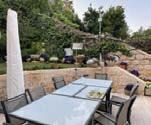
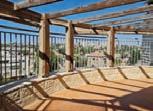

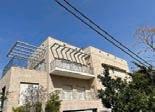
New apt for sale in BAKA 113 sqm with terrace 6.8 sqm. Shabbat elevator 4,700,000 NIS
Yemin Moshe beautiful property over 300 sqm. 2 private entrances (complete separate unit over 90 sqm). large garden. Close to parking & gorgeous architectural design newly renovated. Call for more info

In the heart of BAKA enclosed in a magical courtyard: 3 bedrooms 2 full bathrooms one flight up. Beautiful spacious sukka terrace facing open gardens. Completely renovated with architectual design & high level finishes. 6,250,000 NIS
BAKA Penthouse. 154 sqm on one floor with 4 bedrooms and 2 full bathrooms. Shabbat elevator, 2 underground parking and 3 storage units!!! 25 sqm Sukka terrace off living room plus large roof top terrace. 6,650,000 NIS
GERMAN COLONY 145 sqm apt. Duplex unit that is 1/3 of a private Templar house. Large salon/dining/ kitchen (open floor plan), 4 bedrooms (2 ensuite on main floor, 2 upstairs), study, 3.5 baths. House is in Tabu, private garden 135 sqm. 11,000,000 NIS
Eta Morris Realty, Ltd. etamorrisrealestate@gmail.com
Eta: 054-723-3863 · Rachel: 052-546-6425 etamorrisrealty.co.il





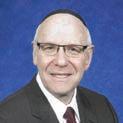
Sefer Hoshe’a, the first book of the Trei Asar, the twelve “minor” prophets, is a collection of prophecis replete with condemnation and criticism of the Northern Kingdom of Israel Throughout its fourteen prakim, the navi Hoshe’a focuses upon the faithlessness of “Efrayim”, and her abandonment of Hashem. In order to better understand the message of this book and, therefore, this week’s haftarah, we should understand the specific time and the histori cal events that took place during this era.
Hoshe’a prophesied during the reign of Yerov’am ben Yo’ash (Yerov’am II) who ruled over the Northern Kingdom for 41 years. Like his namesake, Yerov’am angered Hashem, following the idolatrous and cor rupt ways of his predecessor. Nonetheless, the text describes his military victories, through which he succeeded in restoring Israel’s original northern border. Her mil itary successes and the lengthy reign of
In a good area in the Moshava - 2-story garden apartment, 200m + 190m garden, in Tabu, has great potential, parking, storage, for renovation. Asking 8.2 million NIS In a good area in the Moshava2 apartments (can be connected), 1st floor, 170m, renovated, Sukkah porch, parking Palmach - 4 rooms, garden apt. about 100m asking 4.95million NIS Smadar 050-3114040 // 02-642-4329 smadi_bida@walla.co.il
her king, allowed Efrayim to believe that the era of stability and security was proof enough that the prophet’s claim of Hash em’s anger of their corrupt behavior and devotion to false gods, was unfounded. Our haftarah opens with the nation’s claim that deception and falsehood was part of our very past. The Malbim offers a unique approach to understanding the words of Hoshe’a and explains that these opening verses reflect the peoples’ argument against the navi’s criticism. Denying that they were guilty of dishonesty, they claimed that deception was part of Israel’s past: Ya’akov was forced to escape to Aram due to his decep tion and he was then deceived by Lavan and, despite this, he still continued to “protect” the flocks he guarded. Likewise, they argued that Hoshe’a’s criticism of their idolatrous wor ship of the “calves” (agalim”) was also untrue since it was a navi who was sent by Hashem to release the nation from Egypt and a navi, who, despite their worship of the golden calf, “pro tected” them from punishment! Remarkably, the people were telling Hoshe’a that it was, therefore, his responsibility to defend them before G-d – not condemn them!!!

The navi rejects their arguments, reminding them that their “powerful” king had turned to

idols only because of his fear that, were the people to return to worship Hashem, they would rebel against him, joining the South ern Kingdom in their worship of Hashem in the Bet HaMikdash, just as Yerov’am I had feared years earlier. Hoshe’a fills his message with the warnings of the coming disasters that would befall the Kingdom if they do not cease their idolatrous ways. Powerfully, the prophet also brings up their past history, reminding the nation of all the kindnesses that G-d had done for them and how they had paid back those favors by forgetting His love and aban doning His worship.
Perhaps more than any other theme, Hoshe’a – throughout his sefer – calls out Israel for her lack of gratitude to G-d and appreciation for what He had done for them. He resorts to bringing up the past when speaking to the sinful nation in the hope that they would finally be able to remember what they owe their Heavenly Father and, as a result, return to Him.
The harsh words of the prophet’s message do not complete his Sefer. On the contrary, the final message of the haftarah – and Hoshe’a’s book - is one of comfort and promise. The book - replete with warning, criticism and reproach of the nation - closes, fittingly, with a call for repentance and with the prom ise of G-d’s eventual return to His people.
It is this “coda” that opens the haftarah that precedes Yom Kippur. Indeed, it is that cry “Shuva!”, that gives the title to that Shabbat itself.
VISIT OUR NEW WEBSITE www.eifermanrealty.com
NEW ON MARKET! Renovated 4 rooms, MB with en suite bathroom, 1st floor, 3 air exposures, A/C, succah balcony, storage room
EXCITING PROJECTS, BUILDINGS: Presales, Under Construction, Ready to Move In. Buildings and Villas w/building rights + permits Call for more information
* In a small building, 125 sqm, private entrance, 3 exposures, Excellent potential, NIS 4,300,000!
* 5 Bdrms, 135 sqm spacious duplex, succah, private elevator.
OLD CITY
Magnicent 8+ room home with view to Har Habayit!
HAR NOF
* NEW ON MARKET!
Centrally located! 4.5 rooms, low oor, elevator, MB en suite, succah, machsan, Immediate
* Shlav A - 170 sqm duplex garden apt. , open view!
* Shlav A - 4 bdrms, renovated, spacious LR DR, succah * Shlav B - 200 sqm garden duplex apartment, beautiful kitchen, wrap around garden.

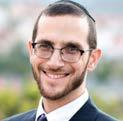
And she conceived again and bore a son, and she said, “This time, I will thank Hashem! Therefore, she named him Yehuda… (Bereshit 29:35).
Leah names her fourth child “Yehuda” (which means “thanks”) to encapsulate her appreciation for having given birth to a fourth son.
The Gemara in Berachot (7:) states as follows: ארבש םוימ יחוי רב ןועמש יבר םושמ ןנחוי בר רמאו התאבש דע ה”בקהל הדוהש םדא היה אל ומלוע תא ה”בקה .”ה תא הדוא םעפה“ רמאנש ותדוהו האל Rav Yochanan in the name of Rabbi Shimon Bar Yochai said: from the day God created the world no one expressed gratitude to Hashem until Leah did so as is stated: “This time I will thank Hashem.”
This is a somewhat puzzling statement. Is it possible that Adam who is credited with composing mizmor shir l’yom HaShabbat, tov l’hodot l’Hashem, did not thank God? Avraham and Yitzhak never expressed appreciation to Hashem? Could it be that Leah was the first human being to truly thank Hashem?
There are several explanations offered. In
the past we offered the following explana tion. The avot certainly praised and thanked Hashem, but they lived a life of tremendous miracles, so their praise may not be viewed as on the highest level of hodaa. Leah, on the other hand, gave birth to Yehuda in the usual, natural childbirth. Thousands of babies are born each day. What was the great miracle of Yehuda’s birth? It was natural. No great miracle occurred. Leah recognized Hashem’s greatness and kind ness and thanked Him for what most of us view as natural. Leah was the first to thank Hashem for something natural, recogniz ing that there’s nothing natural about it. To appreciate what appears mundane is often a great miracle performed by Hashem on our behalf (See Shalom Rav, Koren Press).
In his sefer Lehitaneg Betaanugim Rav Greenboim offers an alternative important insight based on the following story. Rav Sha lom Messas, the Rav of Jerusalem was once invited to speak in a Yeshiva. After completing his shiur, he began descending the staircase and accidently dropped his cane. Several students jumped to pick up and return the cane to the elderly Rav. Rav Messas refused and easily walked down the stairs without his cane. The students were shocked how well he walked without his cane and asked why he used it since it did not appear that he required the assistance of the cane.
The Rav explained that ten years earlier he underwent a dangerous surgical
procedure, and it was not clear whether or not he would be able to walk again. After months of physical therapy, miraculously, he was totally cured and able to walk on his own. In order to express his gratitude to Hashem, he decided to use a cane, although not necessary, so that he would constantly be reminded of the grace of God, who mirac ulously healed him.
Adam and others likely praised and thanked God. They may have done so, but it was on occasion. Leah, however, was the first to call her son Yehuda – a name that would serve as a constant reminder to be thankful for the blessings she received. It is not enough to simply say “thank you” once in a while. We ought to constantly express our gratitude. May we emulate Leah’s attitude and constantly offer our appreciation.
www.angelrealty.co.il



For Sale in The Village, Zayit, Eftat Stunning 210m 8 room cottage, 2 private parking spots, central A/C. 4,800,000 NIS
For Sale in Dagan, Efrat Stunning 8 room cottage, middle unit. 3 floors, 230m. 5,250,000 NIS
For Sale in Gefen, Efrat Beautiful 5 room duplex garden 2,850,000 NIS For Sale in Dekel, Efrat 4 room apt. 2,150,000 NIS
For Sale in Olive Project, Zayit, Efrat Gorgeous 4 room apt. 120m. 2,850,000 NIS For sale in Zayit, Efrat 5 room garden apt. 2,850,000 NIS Contact Gabi for more info 0524588716 Gabi 0524588716

Yaakov Avinu’s arrival in Charan is recounted in great detail. The Torah describes how Yaakov sees 3 flocks of sheep resting near the well as their shepherds wait nearby. He strikes up a conversation with the shepherds asking them where they are from, whether they know Lavan and then, it seems he rebukes them, “Hen od hayom gandol, lo eit hei-asef hamikneh, hashku hat zon u’lechu re’u – But it still the middle of the day, it’s not yet time to bring the livestock together. Why not water the sheep and go on grazing?” (Bereisheet 29;7) It is a curious exchange. How does Yaakov, a stranger to the region, have the impudence to offer reproach to the local residents? More than a simple story, this section offers us a model for how and when to rebuke others.
The Seforno explains that a tzadik cannot tolerate any type of injustice. Yaakov, there fore, felt compelled to react to what appeared to him as the travesty of stealing from an employer. The Malbim qualifies this view as Yaakov first asks the shepherds, “From
GET FIT WHILE YOU SIT: Exercise for ladies
Join us on Sundays 12:45-1:30pm at the OU Israel Center Sura Faecher 0504153239
where do you come?” (Bereisheet 29;4) He gives them the benefit of the doubt; if they have come from afar, they would need time to rest before continuing with their work. This is the first step before castigating others for their behavior. We must check the facts and clarify the situation.
Rav Kaminetzky, based on many Rishonim, notes that the key lies in the first word that Yaakov uses, “achai - my brothers.” Yaakov Avinu shows warmth and affinity towards the shepherds. After establishing a rapport with them, they are more readily able to receive Yaakov’s censure. Step two requires an understanding that comes from a place of love and concern, not from superiority. Indeed, before rebuking others, including family members and friends, we must ask ourselves, what is our motivation? Do our words express compassion and sensitivity or criticism and derision?
Rabbi Alpert, in Lemudei Nissan, shares the importance of building a relationship before admonishing others. He notes that Yaakov Avinu attempts to converse with the shepherds who respond rather curtly, clearly not interested in chatting with him. It is only after he asks about Lavan’s welfare that they add more information, “Vehinei Mazal Tov to Devra & Gidon Ariel and family on the births of a granddaughter and a grandson
Rachel bito ba’ah im hatzon – here is his daughter Rachel, coming with the sheep.” (Bereisheet 29;6) Yaakov Avinu now real izes that they feel more open to connecting with him. Thus, he feels comfortable com menting, “It is still the middle of the day, not yet time to gather in the livestock.” Since the passuk does not state, “he said to them,” Rabbi Alpert suggests that Yaakov Avinu said the words out loud, as if talking to him self, so they would overhear. When they don’t respond, he becomes more direct and asks, “Why not water the sheep and go on grazing?” Yaakov Avinu begins his rebuke in a gentle and indirect way, so they don’t feel targeted or attacked. He allows them to respond, giving them a chance to save face. What a powerful tool in rebuking others, allowing the message to penetrate in an agreeable, manageable way.





The avodas ha-tefillah of Rebbe Yisrael, the holy Baal Shem Tov, was known to be a lofty prayer service, filled with intensity and often lasting for hours on end. Long after conclud ing their own davening, his disciples, known as the Chevraya Kadisha, the ‘Holy Fellow ship’ of Medzhibozh, would return to the beis medrash and join their Rebbe. As they arrived, they would form a circle around the tzadik, witnessing and taking part in his avodah. One day, as the Rebbe’s davening was particularly drawn out, the chevreh began to run out of steam. Assuming the Baal Shem Tov would be deep in d’veykus for many more hours, they began to slip out, one by one, for a coffee, a bite to eat or a few minutes of rest.
Much to their surprise and dismay, when they returned, they found that the Baal Shem Tov had already completed his davening. Embarrassed, they asked their Rebbe why he’d concluded his avodah so much earlier than usual. The Baal Shem Tov sighed and shared a mashal:
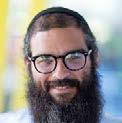
A group of travelers was passing through the forest, and their leader, a man with unusually keen vision, spotted an exquisite bird at the top of a tall tree. As the others couldn’t see the bird, the leader tried to reach upward and catch it so they could enjoy its beauty as well.
Without a ladder, though, the beautiful bird remained out of reach until the men began to climb onto one another’s shoulders. Con structing a human ladder, they hoisted their leader upward until he was able to reach the bird and bring it down for all to see….
The Baal Shem Tov explained to the cha sidim, “When I meditate in Amidah, many hidden things are revealed to me, but my consuming desire is to ascend to the level in the World Above which the Zohar calls ‘the Palace of the Bird’s Nest’ — the abode of the Mashiach. But I cannot reach that height un less I first stand you, my disciples, on each others’ shoulders.
“Imagine,” continued the Baal Shem Tov, “what would happen if the person at the bot tom supporting the ladder suddenly decided to leave. Everyone would fall, including the person with the keen vision, and he could be injured by falling from such a great height.”
“But when you remain with me in the beis medrash — even without any knowledge of what is going on — I am able to place you on each other’s shoulders, so to speak, reach the Chamber of Mashiach, and bring some of that beauty down for us to share and appreci ate together. I cannot do it without you.”
As a refugee running from a brother who sought to kill him, Yaakov Avinu’s future is uncertain. With nowhere to go and no roof over his head, Yaakov experiences a Divine encounter on the Temple Mount: “And
Yaakov encountered the Place — and he slept there.”
“And Yaakov encountered the Place — and he slept there, for the sun had set….”
gematria, numerical value as לוק, ‘voice’ — “for the voice of the tefillah of the tzadikim is a ladder upon which the angels ascend.”
“And he had a dream: a sulam, a ladder, was set on the ground and its top reached to the heavens, and messengers of God were going up and down on it.”
(28:12)
“How awesome is this place!” cries Yaakov Avinu as he awakens from this encounter with the Ribbono Shel Olam at the location of the future Beis Hamikdash, the headquar ters of tefillah. He is shocked to realize he had slept at the םימשה רעש, “gate of the Heavens”, where all prayers ascend to the World Above.
During the previous evening, after the sun had set, Yaakov had davened. Based on this, our Sages (Berachos, 26b) instituted Arvit, the evening prayer: הלפת אלא העיגפ ןיאו :םֹוקָּמַּב עַּגְפִּיַו
“‘And Yaakov encountered the Place:’ the word ‘encounter’ always means prayer, as it is said when Hashem spoke to Yirmiyahu Hanavi, הנר םדעב אשת לאו הזה םעה דעב ללפתת לא התאו
‘And you, do not pray on behalf of this nation and do not raise on their behalf song and prayer, and do not tifga, ‘encounter’ Me, for I do not hear you’” (Yirmiyahu, 7:16).
Jewish mystical tradition frames our for mal ‘encounter’ with God in tefillah as one of ascent, climbing through spiritual dimen sions to the Supernal World. Indeed, Rebbe Yaakov ben Asher, the Ba’al haTurim, writes that the word sulam, ladder, shares the same
Dr. Avraham (Alan) Rosen is a prolific author and editor of Holocaust literature, testimony, and history. He was a talmid muvhak of Prof. Elie Wiesel, zy’a, for almost forty years. As a doctoral student and project director for the Wiesel Living Archive at the 92Y, he maintained a monthly chavrusashaft, sharing and learning Torah with Prof. Weisel on Rosh Chodesh. During one such shmooze on Rosh Chodesh Kislev, Dr. Rosen pointed out that the upcoming sedra related Yaakov’s dream vision of a ladder mutzav artzah v’ro sho magiah hashamayma, “stretching from the ground toward Heaven.” He commented: “Is there any greater episode, or more splen did image, than that of this ladder?”
Quoting the pesukim by heart, Prof. Wiesel shared his interpretation. “...We help each other rise by being one another’s ladder.”
Chevreh, together we are creating a ladder for each other, supporting and enabling one another’s avodah and ascent. May we remain present and committed, holding each other up and providing strength and encourage ment in our efforts toward higher encounters with the Ribbono Shel Olam.
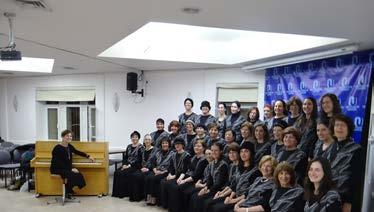
ׁשֶמֶּׁשַה אָב־יִּכ םָׁש ןֶלָּיַו םֹוקָּמַּב עַּגְפִּיַו
הָמְיָמָּׁשַה ַעיִּגַמ ֹוׁשאֹרְו הָצְרַא בָּצֻמ םָּלֻס הֵּנִהְו םֹלֲחַּיַֽו
ֹוּב םיִדְרֹיְו םיִלֹע םיִקֹלֱא יֵכֲאְלַמ הֵּנִהְו
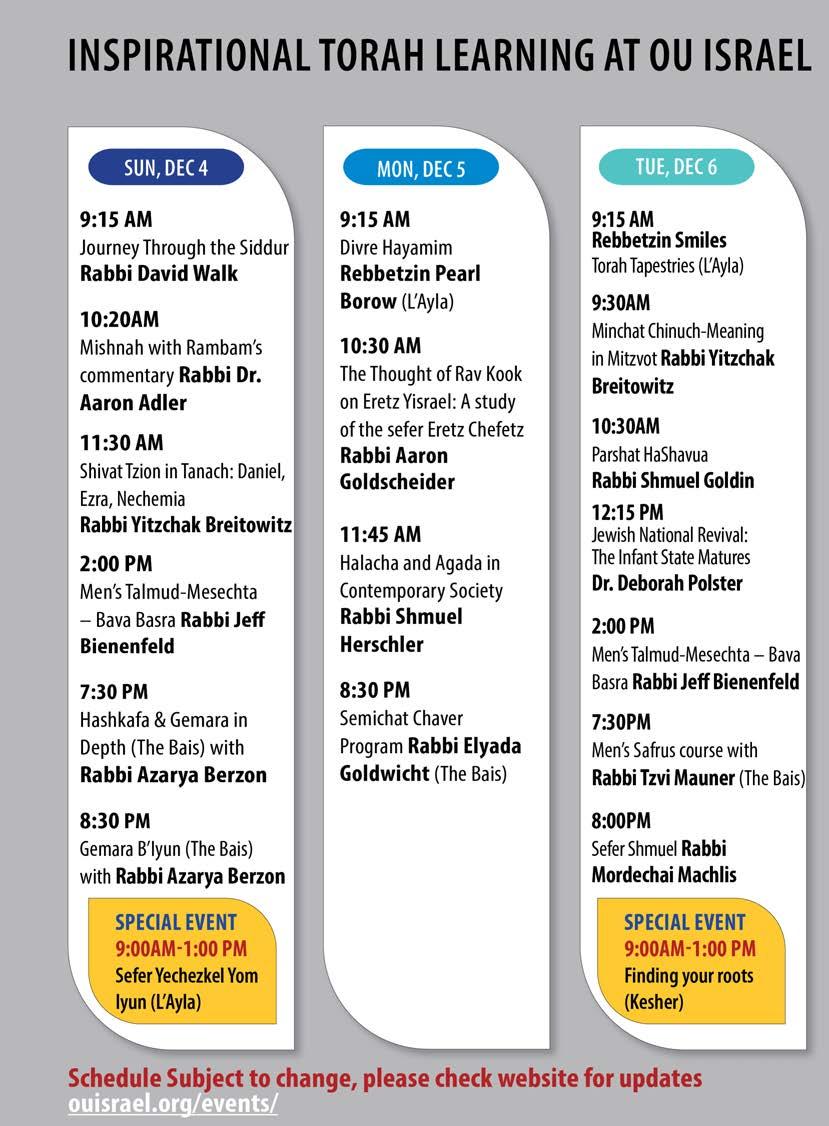
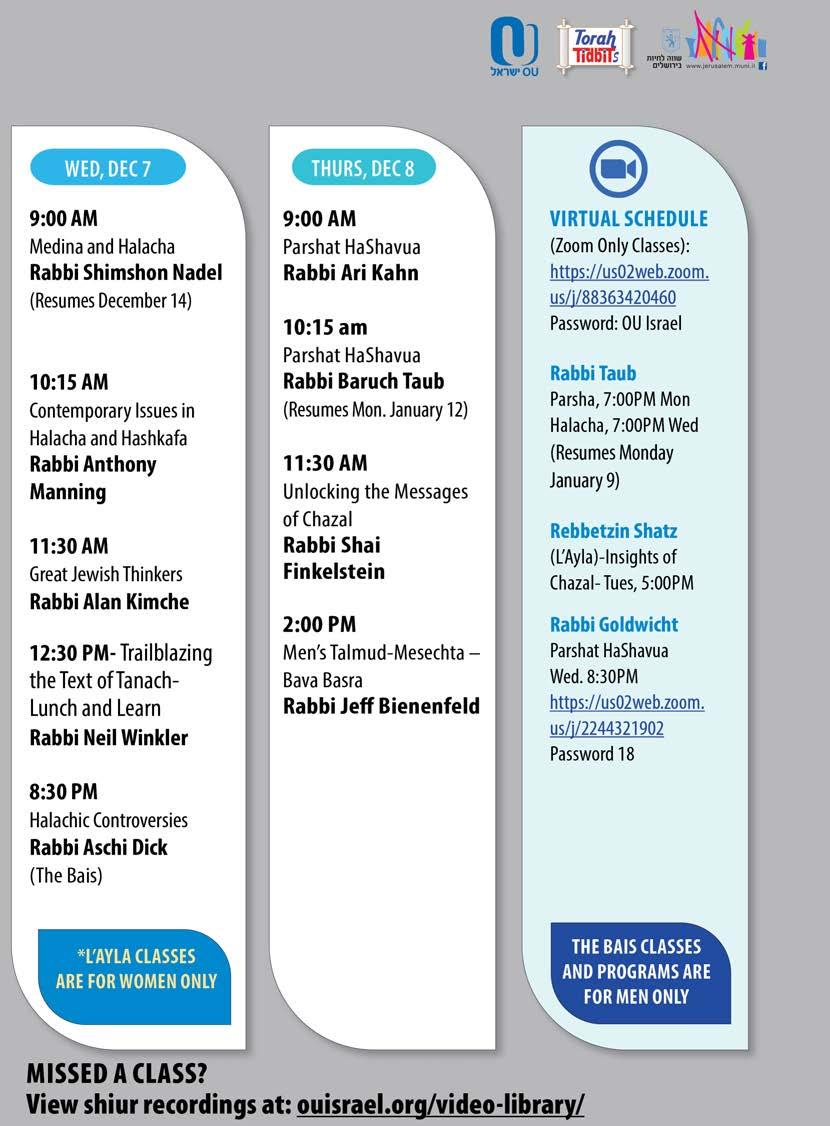

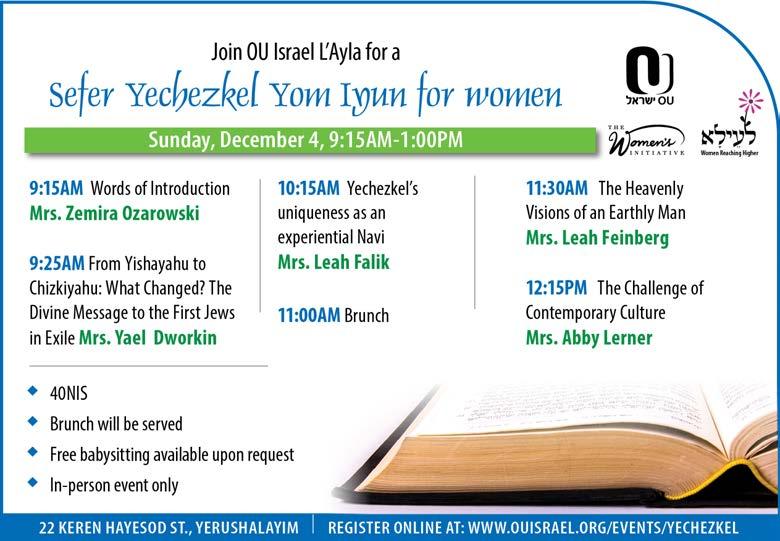
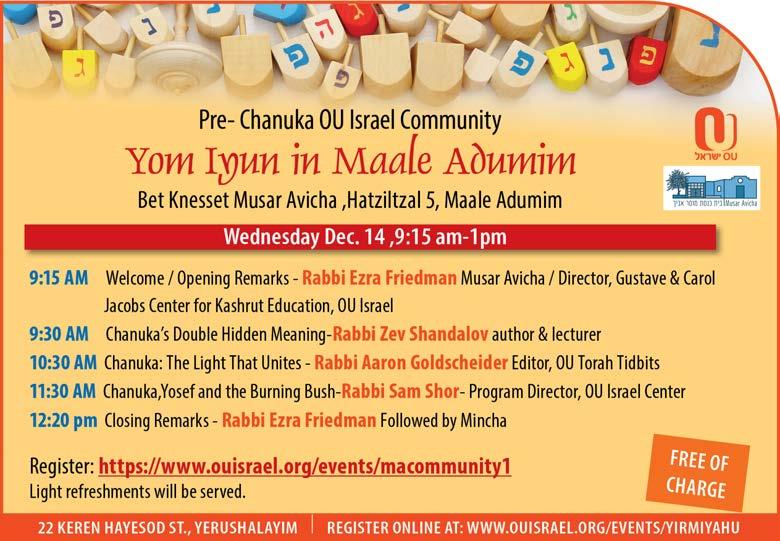
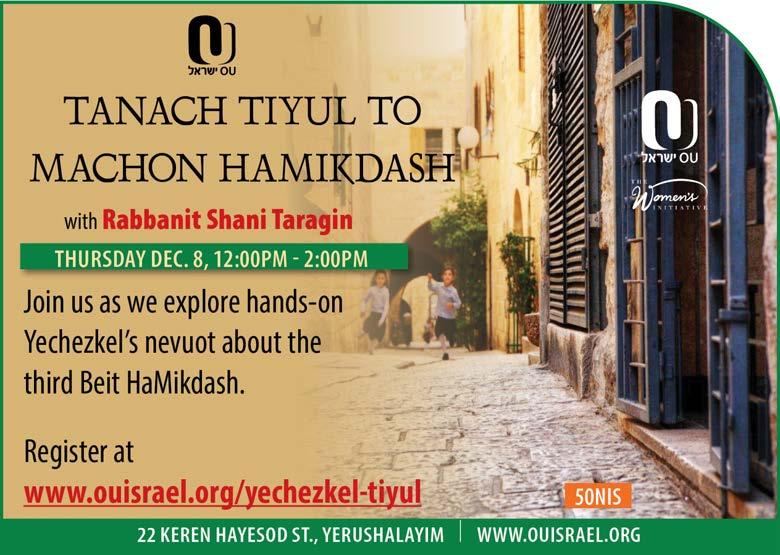


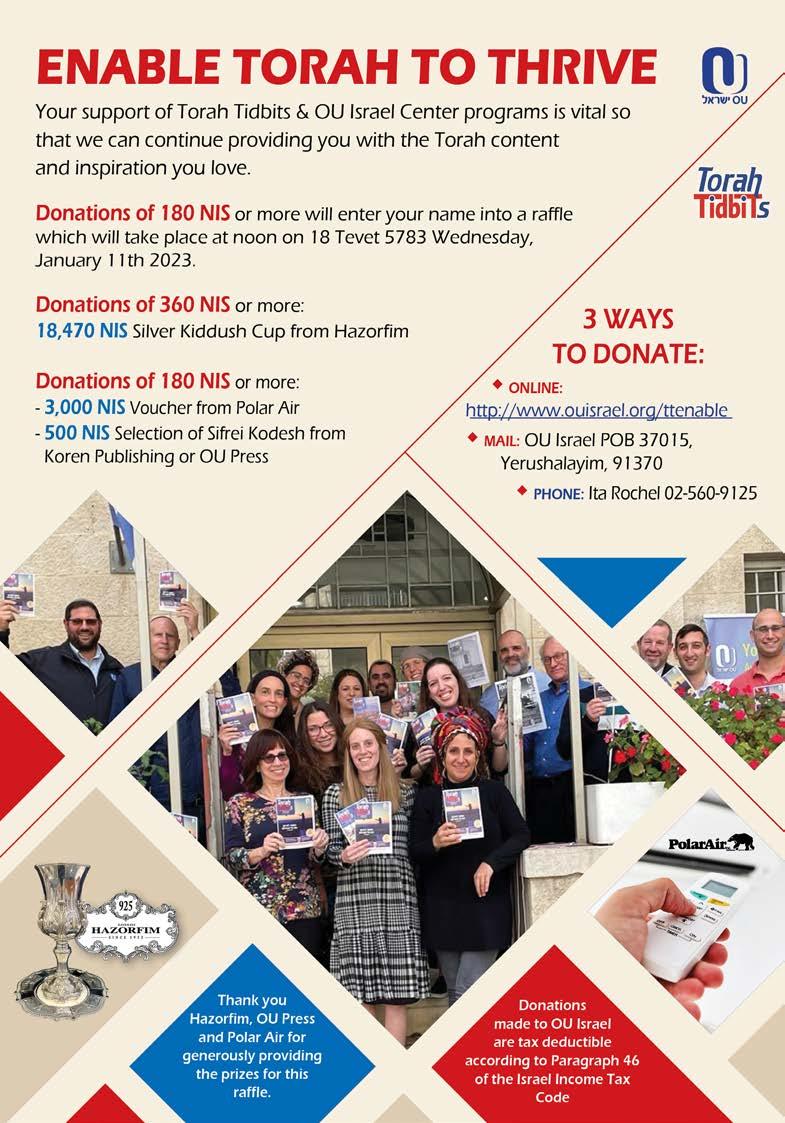
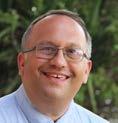
Our Sedra, Parshat Vayeitzei opens with Yaakov departing from Be’er Sheva toward Cha ran, in order to flee from the potential danger he faced at the hands of Eisav, following Yaakov’s masquerade,pretending to be Eisav, and receiving the bracha from Yitzchak.
The Torah tells us:
He came upon the place and stopped there for the night, for the sun had set. He took from the stones of that place, and placed it under his head and lay down in that place. Just a few verses later we read: םָׂש־רֶׁשֲא
Early in the morning, Jacob took the stone that he had put under his head and set it up as a pillar and poured oil on the top of it.
The Gemara in Chulin explains the apparent contradiction between these two verses pertaining to this incident.
It is written: “And he took from the stones of the place, and placed them under his head, and lay down in that place to sleep” (Breisheet 28:11). And (a few verses later) it is also written: “And Yaakov rose up early in
the morning, and he took the stone that he had placed under his head, and set it up for a pillar, and poured oil upon the top of it” (Breisheet 28:18). The first verse indicates that Yaakov took several stones, whereas the latter verse indicates that he took only one stone. Rabbi Yitzchak says: This teaches that all those stones gathered to one place and each one said: Let this righteous man place his head upon me. And it was taught: And all of them were absorbed into one large rock.
According to our gemara, the many stones super-naturally merged together to become one stone, upon which Yaakov Avinu would rest his head at this sacred place.
The Ohalei Yaakov, Rebbe Yaakov Fried man of Husiyatin, zy’a, was one of the great religious personalities of the pre-state Yishuv and early years of Medinat Yisrael .The Rebbe of Husiyatin, was fortunate to make aliya from Poland, just ahead of the Nazi onslaught, settling in Tel Aviv in 1938, where he lived until his passing in 1957. Within the Rebbe’s beautiful teachings we not only find depth and inspiration, but are often given a glimpse of this very chal lenging period in Jewish History.
The Rebbe sees within our verse and the Gemara’s interpretation of our verse, a powerful message which is as relevant today as it was when the Rebbe shared these words in 1947.
The stones coming together as one is a message and allusion to the future. As the Jewish People gather from all corners of the Earth and return to make Aliya to Eretz Yis rael, Am Yisrael will need to unite and come together to take action. It is not enough for us to say Mashiach has not yet arrived, and therefore we await his arrival and he will take us forth, rather we must first come together and take action, and then that will hasten our full redemption. The stones coming together and becoming one stone, teaches us that it not simply enough for us to gather together from across the globe, rather the key to our success and ultimate redemption is to come together and become one united entity-Shalom and Achdut-Peace and Unity among the Jewish People will ultimately fix the entire world.
The Rebbe’s powerful insight continues
to ring loud and clear, more than 75 years later. Now, perhaps more than ever, there is a need for the Jewish people to unite and come together as one, as we secure our future here in Artzeinu Hakedosha.
Yehi Ratzon, may each of us heed this beautiful teaching from the Rebbe of Husi yatin zt’l, and may we merit to see that unity, and ultimate redemption and tran quility for the entire world.

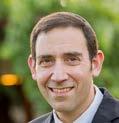
Ya’akov worked for seven long years, patiently awaiting the day he would marry Rochel, start his family and perhaps, com mence his return to Israel. He hoped that after seven years of hard labor his bitter odys sey in a foreign land would come to a close. Even if his return to Israel were delayed, his marriage to Rochel would liberate him from his burdensome labor. As a married man, he would hold more sway in Lavan’s house and would possess both greater leverage as well as freedom of movement. During those seven long years of labor his horizons of hope were wide open, as he looked forward to bet ter times.
As we all know it didn’t end that easily. It never does. Life is seldom as smooth and simple as we imagine. Ya’akov was deceived by his father-in-law into marrying Leah and this subterfuge compelled him to an additional seven years of hard labor for the “right” to also marry Rochel. Even after marrying Rochel and laboring an additional seven
years, his trials didn’t cease, and it took him an additional six years to disentangle himself from his swindling father-in-law. All told, he spent twenty years in a foreign land and in the clutches of his devious father-in-law before returning with his family to Israel. Despite his initial hopes for a brief sev en-year expedition and a rapid turnaround, Ya’akov’s ordeal lasted far longer and was far more complicated than he could ever have imagined.
Chazal viewed Ya’akov’s marital odyssey as a metaphor for Jewish history and for the redemptive process. As the midrash comments :בקעי המ םכיבא בקעיל המוד םכלש אמגוד דבעתשנ השא אשנשמ דבעתשנ השא אשנ אלש דע םכיבא םתא לאוג דלונשמ םתדבעתשנ לאוג דלונ אלשמ םתא ףא םידבעתשמ. Just as Ya’akov was indentured both before, during, and after his marriages, similarly the Jewish people will endure hard ship both before their redeemer is born, as well as after he is born. The story of Yaa kov’s dashed expectations is a cautionary tale, signaling that our redemptive arc will also be complicated, and warning us against adopting simplistic redemptive narratives. Our geulah will be convoluted in the same manner that Ya’akov’s marital process was prolonged. Redemption will not be a straight line, but rather a jagged journey.
We often adopt simplistic redemptive assumptions. We presume that redemption will be immediate and conclusive, yielding a utopian reality absent of any hardship or
struggle. We naively expect all our outsized redemptive expectations to be met as soon as the redemptive process is launched. When, and if, redemption evolves more gradually and with less than idyllic conditions, we doubt its validity or its divine source.
Ya’akov’s marital misadventures debunk these simplistic notions of redemption. Redemption isn’t immediate and it certainly isn’t smooth. There are watershed moments in which redemptive potential develops, but it may take time for that potential to fully materialize. That redemptive period may be marked by hardship and struggle even as the overall process surges toward a final and complete redemption.
We cannot allow naïve expectations which go unfulfilled, to fluster our redemptive stamina. In the mid-90’s we relinquished land in Israel hoping to achieve a durable peace, which, sadly, remained and continues to remain elusive. Independent of whether this proposed peace agreement was pru dent, any relinquishing of land in Israel is a heartbreaking setback. Many were disil lusioned by this calamity, concluding that the redemptive process had screeched to a halt. Ya’akov’s entanglement reminds us that even as redemption unfolds, the struggle for complete geulah continues. Redemption and struggle go hand in hand. The process may include lags and even setbacks.
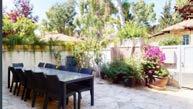


Even when redemption does surge for ward, we can still experience struggles and possibly, even reversals. Even after Ya’akov’s second marriage, in which he finally weds Rochel, his struggles with Lavan continue, and even intensify. His repeated efforts to disassociate with Lavan fail, forcing him
to escape with his wives and children in the “middle of the night”. Similarly, our redemption may stumble even after it surges forward. Even after we witness redemptive advances, we can still encounter adversity and frustration. Nothing is guaranteed but the terminus. Final redemption will one day arrive and the journey toward that condition has begun. How soon we arrive and how rocky the road to final redemption will be, are each unknown.
During the second seven-year term of his labor Ya’akov didn’t just struggle with Lavan, but was also busy constructing the foundation for his future. During those years, his wives bore eleven sons who would later form the bedrock of the twelve tribes and of the Jewish nation. Those subsequent years, when he labored as a married man were characterized by struggle and adversity, but also by phenomenal growth, expansion, and development of his future.
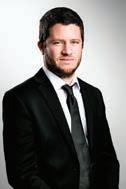
We have yet to receive our final, perfect, and long-awaited for redemption. Many are waiting for our redemptive struggles to end, for optimal redemptive conditions to develop and for a perfect Messianic world to emerge. Others have decided to build while we wait. Though we haven’t yet achieved the
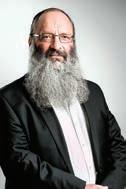
redemption of our dreams, we are slowly but surely building the infrastructure for that future. The society we build will serve as the foundation of our future utopia. The religious spirit we infuse into our secular culture, will, one day blossom into deeper and broader religious commitment. The roads we build will serve as causeways along which thou sands pilgrimage to Yerushalayim for the chagim. Our efforts to absorb immigrants from vastly different cultures will, one day yield a common narrative and sweeping national unity. Every stone we lay, will serve as the foundation of the city we will one day raise.
We have so much to build and so much to construct. Instead of wasting our time sorrow ing over the imperfect state of redemption, let us continue building that future. Perhaps, one day, our eyes will gaze upon the radiant and golden city of Yerushalayim with a Mikdash perched at its center. Perhaps we will be that fortunate. Alternatively, we may not be that fortunate and this vision will only occur long after our eyes have permanently shut. Either way, we will have built a historical platform for the future. If our eyes don’t witness final redemption, at least our handiwork will greet it. We may not personally witness it, but our fingerprints will be all over it.


In Parshat Vayetze, Yaakov embarks on a life-changing odyssey, leaving Eretz Yis rael for Haran. However, his journey was not just a matter of changing geographical locations: Yaakov was leaving his spiritual comfort zone for unknown pastures replete with challenges to his worldview.
The question is often asked: Why did Hashem create a world where instead of dwelling in tranquility while observing His mitzvot, we face many vicissitudes, includ ing dealing with the internal and external influences that threaten our well-being and challenge our faith?
Let us visit Yaakov and observe his take on that question. How did he prepare for the upcoming trials related to living in a spiritual wilderness?
First, suggests the Lubavitcher Rebbe, Yaakov recognized that he was put into this world to be part of it, to interface with reality with all its incumbent difficulties, and not to be a recluse whose only focus was Torah study. More so, Yaakov understood (as per haps we should) that we must embrace the material world in order to raise it to a higher spiritual level of Kedushah.
Yaakov would not seek trouble, but he knew to be prepared for eventualities
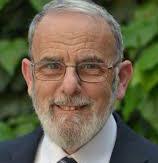
and confrontation with the “other side.” Indeed, if “Nisyonot” – spiritual challenges or tests – came his way, he would accept, even welcome them. Rather than despair ing, he internalized that overcoming these kinds of adversities was his purpose in life.
When Yaakov laid down to rest, he placed stones around his head, ostensibly (following Rashi) to protect himself from wild animals. But why, asks the Rebbe, did he place stones only around his head? –Because, for the Rebbe, the head needed to be protected from the spiritual wild beasts about to impinge on Yaakov’s cognition, moral fiber, and ethical sensitivities.
Yaakov needed to remain cool-headed and determined in his new environment. Yes, he would take care of his material con cerns and provide for his (future) family. But he would not sacrifice the standards of right and wrong inherited from his holy fathers for an easier godless existence.
In that context, the Rebbe reminds us of David Hamelech’s assertion (Tehillim 128): לכאת יכ ךיפכ עיגי .ךל בוטו ךירשא
“When you eat the labor of your hands Happy you shall be, and it shall be well with you.”
May we be blessed with finding that bal ance between Kodesh and Chol with the same faith and fortitude as our forefather, Yaakov.
Celebrating 21 years on stage
Performances:
Heichal Hatarbut Gush Etzion : November 27th and 30th

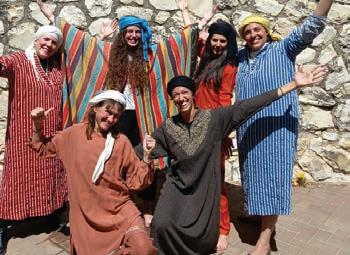




Shalva Auditorium - Jerusalem: December 4th and 7th
Heichal Hatarbut Bet Shemesh : December 11th



In English with Hebrew surtitles by Ehud Manor
For tickets: www.raiseyourspirits.org Group orders/info call: 0528651766 / 0528838839
Director: Toby Klein Greenwald Music Director: Elisheva Naomi Savir Choreographer: Maayan Allen
With the support and encouragement of the Matanel Foundation www.matanel.org
Presents By arrangement with the Really Useful Company Ltd Lyrics by Tim Rice, Music by Andrew Lloyd Webber and of the Foundation It’s never too late to help the needy! We receive heartbreaking requests daily Now, you can contribute to this Chesed Fund in various ways:
• Please assign checks to YESH EZRA and send them to Yesh Ezra, POB 36156, Romema, Jerusalem
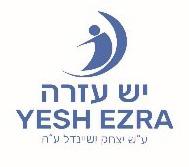
• Enter the Website at www.yeshezra.org and follow the instructions for $ and NIS contributions.
• Call Sara at 077-820-0196, SundayThursday, 10:00 am-3:00 pm, to donate with a credit card. Thank you! Inquiries or bank transfers: Menachem Persoff menpmp@gmail.com 050-570-1067
The yearning of those who desire to live in the Land of Israel even when the intentions are motivated by mundane considerations and solely for the welfare of the nation is noble and exalted; owing to the fact that whenever there is a yearning in the nation of Israel for even materialism, with time it will culminate in a spiritual realization…” (Eretz Chefetz 1:11)
The Torah praises the Land of Israel for its seven grains and fruit: “It is a land of wheat, barley, grapes, figs and pomegranates;a land of oil olives and honey dates (Devarim 8:8).
The Talmud (Berachot 41b) discusses which blessing is recited first when the different items of the seven species are avail able to be eaten. Rabbi Hisda says that the most logical preference in reciting a bless ing should reflect the order of the produce mentioned in the verse. So, for example, one

first recited a blessing over the pomegranate before a date. Rabbi Hamenuna, however, explained that while the order in the verse is indeed important, there is even a more important factor: how close is the name of the fruit to the word Land in the verse.
Rav Hamenuna explains that pomegran ates are the fifth produce mentioned after the first time Land appears in the verse. Dates, however, are the second fruit men tioned after Land appears a second time in the verse. In other words, the position of dates in the verse indicates a greater close ness to the Land of Israel; therefore this fruit deserves to come first.
Rav Hamenuna suggests that the proxim ity of the word to the Land is an expression of love of the Land.
Rav Avraham Yitzchak Hakohen Kook commented on this passage and stated that one who is closer to the Land, and demonstrates a greater connection to it, should be blessed first. Such a person is closer to attaining wholeness and a closeness with
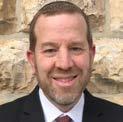
the Almighty that is only obtained through the Land alone.
Rav Kook expands on this idea and offers a remarkable interpretation of the deeper meaning of the verse above which describes the seven species.
We may ask, why is the word Land men tioned twice in the verse? Why does the verse divide up the produce of Eretz Yisrael into two categories?
Rav Kook suggested that there are in fact two types of love for the Land of Israel. There are those who appreciate its holiness and spiritual qualities. Others, however, appre ciate its material benefits and work towards rebuilding the Land. The first half of the verse refers to those who love its holiness; the second half of the verse refers to those who are drawn to its physical and practical benefits.
With this in mind Rav Kook makes the bold claim that although the pomegranate listed in the verse belongs to the first group, it remains somewhat distant from its con nection to the Land. The date, on the other hand, is near the top of the second group.The Jews, symbolized the date, devotion is more robust. Their closeness and dedication to the Land is therefore even more precious than the first category of commitment, because it is more passionate and impactful. (An excel lent summary of this teaching is found in “Gold From the Land of Israel,” Morrison, pp. 303-306)
Rav Kook’s classic work Orot was met with criticism in the Old Yishuv of Jerusalem. One particular passage accentuates the theme articulated above. Undoubtedly, this was one one of the ideas that did not sit comfortably with some of Rav Kook’s opponents.
“The nefesh of those secular Jews who are connected with great love to matters of the Jewish nation, to the Land of Israel, and to the revival of its people, is more perfected than the nefesh of religious Jews who lack this profound concern for the Jewish people and for building up the Land of Israel. On the other hand, the ruach of those who are religious and follow the Torah and mitzvot is more perfected.” (Orot, Hatechiyah #43, translation from “The Spiritual Revolution of Rav Kook,” Schwartz, pp.134-135))
Rav Kook firmly believed that there will surely come a time when each side will appreciate the other and embrace their positive aspects. “As a result of all of this, a great light will come upon both groups, and a holistic spiritual transformation will emerge in the world. The Jewish people will then be ready for redemption.” (Ibid)

Two amazing passages appear in this week’s Torah portion and both of them teach us much about the power of love.
At the beginning of the parasha, we read that Rachel Imeinu comes to water her flock at a well which is covered with a massive stone. Generally speaking, a combined effort of several shepherds is needed to move this stone from the mouth of the well. But what happens when Ya’akov takes one look at Rachel? “When Ya’akov saw Rachel... he went up and rolled the stone off the mouth of the well.” Suddenly the heavy stone becomes light. Inspired by the sight of Rachel, Ya’akov virtually defies the law of gravity itself.
Afterwards, Ya’akov works seven years in order to marry Rachel, and this period is described in the following beautiful verse: “So Ya’akov worked seven years for Rachel and they seemed to him but a few days because of his love for her.” Once again we see how love vanquishes an arduous challenge: Seven years pass like a few days. If previously the law of gravity was defied, now the idea of time is rendered meaningless.
The connection between Ya’akov and Rachel reminds us of the power of love, of human connection, of those individu als who awaken us, inspire us, and give us extraordinary strength. There are people who clip our wings and others who give us
wings. By whose side should we choose to live?
Walking down King George St. in Jerusalem and want a cold bottle of water? Come help yourself to a bottle at 52 King George.
In loving memory of Yoni’s wife Tziporah a"h, a true Eishes Chayil, always full of chessed, kindness and laughter, and brought life and strength to so many people, that she touched! She was like Aron, who loved peace and pursued peace.

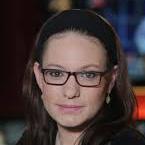
Yoni thanks Hashem for having the opportunity of having Tziporah in his life, to learn of her caring, patience and happiness, to overcome her challenges. May Tziporah's Neshama be a light onto the world, in a time of darkness, and may her Neshama shine to Gan Eden. Yoni misses Tziporah with tears in his eyes, as Hashem gave him a gift, a crown jewel, now he returns her to Hashem. With thanks and Toda. Love, Yoni
To help refill the supplysend tax deductible donations for Be’er Tziporah a"h Bottled Water Gemach to Chabad of RechaviaRabbi Yisroel Goldberg email Rabbi@JerusalemChabad.org 02 800-1717


RAV DANIEL MANN
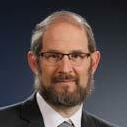
Question: We need a babysitter for a few hours on Shabbat. Is there a problem paying her for Shabbat work?
Answer: S’char Shabbat (pay for permit ted services one provided on Shabbat) is forbidden Rabbinically like other commer cial activity, lest one come to write (Shulchan Aruch, Orach Chayim 306:4; Mishna Berura ad loc. 16). The direct prohibition is on the worker receiving pay (therefore, a Jew may pay a non-Jew but may not be paid by a non Jew), but it is forbidden to give money to one who may not receive it (Mishna Berura 306:21).
The most common way to allow receiving money for work done on Shabbat is through havla’ah. That means having the Shabbat re lated money “swallowed up” by combining it with weekday pay, as pay for a period of work that includes Shabbat (Shulchan Aruch ibid.; Nedarim 37a-b).
Poskim point out that “havla’ah units” are determined not by payment installments but by the period of employment. The period of employment is the time during which there
is a commitment to continue the employ er-employee relationship. We have dealt In the past (see Living the Halachic Process, vol. V, C-19) with a youth leader, whose employ ment unit is a year, in which case it is not difficult to give the leader some responsibil ities during the week, within the course of the year.
This does not naturally work for the aver age babysitter, who is hired for an individual time period, which in this case, is entirely on Shabbat (Shemirat Shabbat K’hilchata 28:58; Orchot Shabbat 22:94). However, poskim (ibid.; ibid. (146)) allow one to create a per mitted merging of employment units in the following manner. When agreeing upon her working on Shabbat, commit to each other that she will also work in the future during the week. The Orchot Shabbat describes the commitment as being absolute, so that even if you would not want to use her again, you would still have to pay for the second time. The Shemirat Shabbat K’hilchata suffices with an expectation of continuing employ ment so that if one backs out, the other would have a grievance on the other. It is possible that the difference is that the former refers to artificially creating another, single babysit ting session, which then must be binding. In contrast, the Shemirat Shabbat K’hilchata is referring to a naturally ongoing relationship over a period of time, which also may explain why he permits even calculating the pay based on the exact hours worked on Shabbat.

The Orthodox Union - via its website - fields questions of all types in areas of kashrut, Jewish law and values. Some of them are answered by Eretz Hemdah, the Institute for Advanced Jewish Studies, Jerusalem, headed by Rav Yosef Carmel and Rav Moshe Ehrenreich, founded by HaRav Shaul Yisraeli zt”l, to prepare rabbanim and dayanim to serve the National Religious community in Israel and abroad. Ask the Rabbi is a joint venture of the OU, Yerushalayim Network, Eretz Hemdah... and OU Israel’s Torah Tidbits.

If you do not have a commitment to an ongoing employment relationship with the babysitter, the above approach can be somewhat complex. Therefore, we pres ent a different form of havla’ah, which can be accomplished at one time. There is a famous heter to pay waiters for their work on Shabbat by requiring them to also work before and/or after Shabbat (see Mishna Berura 306:21). Some also use this system to pay a chazan for Yamim Noraim, by hav ing him be chazan for Selichot as well (see Shemirat Shabbat K’hilchata 28:(144)). In this case, you can arrange it by having her prepare something, in a way that could only be done before Shabbat (e.g., a game, a pic ture), to be used along with the babysitting. It does not suffice for the preparation to be theoretical or possible, but obligatory work that is time-consuming enough to warrant pay (Orchot Shabbat 22:90). Another form is for her to bring food for the kids, so that payment due for its price creates havla’ah that covers the babysitting. This is learned from the Noda B’yehuda (II, OC 26) who jus tified a mikveh operator taking money for the service they provide on Shabbat, as the compensation they deserve for the wood fuel they provide creates a havla’ah.
There is a machloket whether one can take money for providing a mitzva service on Shabbat (Shulchan Aruch, OC 306:5). While babysitting in and of itself is not considered a mitzva (see Nedarim 37a), if she is hired

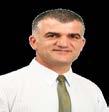
For a Din Torah in English or Hebrew contact ‘Eretz Hemdah - Gazit’ Rabbinical Court: 077215-8-215 • fax: (02) 537-9626 beitdin@eretzhemdah.org
Meir Golan
to enable parents to do a mitzva, it would count as mitzva work (see Bemareh Haba zak III:36). However, the havla’ah system, if done properly, is a broader and more clearly accepted leniency. Meir Golan 077-2050015 052-2678749 www.golan-realestate.net
Old Katamon: 4 room apartment in a small and quiet street, 101 sqm, renovated, very bright and airy, master bedroom, Safe room (mamad), sukkah balcony, view, elevator, 3,400,000 NIS
Old Katamon: 4 room apartment, 90 sqm, well split, bright airy, sukkah balcony facing a magnificent panoramic view, 3 exp Shabbat elevator, parking, 3,290,000 NIS
Old Katamon: Spacious 3 room apartment in a very quiet street, 75 sqm, sukkah balcony facing a green and pastoral view, 3 exp. Shabbat elevator, private parking, storeroom, 2,690,000 NIS
Baka: 5-room apartment, 130m, balcony, Shabbat elevator, huge storage, private parking, 5,100,000 NIS Baka: 5-room garden apartment, 140m, master suite, private parking, storage, full of light, airy, nice garden, 5,250,000 NIS
Old Katamon: 4-room apartment, 94m, balcony, open view, Shabbat elevator, fully accessible, private parking, 3,290,000 NIS

The Greek Colony: 4-room apartment, 85m, balcony, green open view, elevator, great location 3,200,000 NIS
Mekor Chaim: 4-room apartment, 90m, Sukka balcony, Shabbat elevator, fully accessible, 3,600,000 NIS
Arnona: brand new 4 room apartment, 95m, master suite, nice sukkah balcony, fully accessible, private entrance, 3,150,000 NIS
Ramat Sharet: nice 5-room apartment, 120m, full of light, spacious living room & bedrooms, big storage, small sukkah balcony, double parking, 3,450,000 NIS

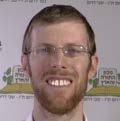 INSTITUTE BY RABBI MOSHE BLOOM en.toraland.org.il
INSTITUTE BY RABBI MOSHE BLOOM en.toraland.org.il

Several months ago, we wrote in Torah Tidbits that unfortunately there would not be farmers who would produce otzar beit din olive oil. The reason for this is in previ ous shemitot, the public avoided buying the holy oil and the farmers suffered financial losses.
One response I received was from Tsvi Klejman, an English speaker who grows 11 dunams (1.1 hectares) of Syrian olives near Rosh Pina. Tsvi served as an otzar beit din agent of the Golan Height Beit Din (Rabbi Uri Sedan, former rabbi of Nov). Now, besha’ah tovah, the oil is ready. The price is set by the beit din, after considering many different parameters. Tsvi does not make a living from the olives, just takes care of them “on the side.” The price covers his expenses and the expenses of the beit din.
Buying Tsvi’s olive oil strengthens farmers who observe shemitah and affords us the privilege to use Israeli olive oil produced by an olive orchard that strictly observed the laws of shemitah. Furthermore, even though we are no longer in the shemitah year, the holiness of shemitah, its halachot and values will continue to accompany us for many months to come.
The olives are grown organically (but do not have official organic supervision since the grove is too close to non-organic olive trees, which makes it impossible to receive an official organic status and due to the high costs of the supervision). Of course, there is no concern of orlah, tevel or kila’im.
Clarification: The olive oil is not super vised by the OU

He has only 300 L of Syrian olive oil. To order: Tsvi Klejman 052-7907759 E-mail: tklejman@gmail.com
He delivers to Jerusalem, Petach Tik vah, Efrat, Raanana, and Rosh HaAyin It is possible to purchase in quantities of 750 mL or 1 L.

Wednesday, November 23 - Rabbi Kimche’s shiur was sponsored by Raymond Jackson in loving memory of a very special wife, mother and grandma, Chaya Chana bat Yonah HaKohen a”h on her 4th Yahrzeit Wednesday, November 23 - Rabbi Kimche’s shiur was sponsored by Arlene & Stuart Gherman in memory or Arlene’s mother, Batsheva bat Leizer a”h on her 17th yahrzeit Wednesday, November 30 - Rabbi Kimche’s shiur is sponsored by Esther Bartov in memory of her father
Rebbetzin Shira Smiles shiur is sponsored for the 2022 academic year by Dr. & Mrs. Menachem Marcus in memory of their parents Rose & Dr. Emanuel Marcus
Rabbi Goldin’s shiur is sponsored for the 2022 academic year by Dr. & Mrs. Menachem Marcus in memory of beloved aunts Irma Haas a”h and Hilde Myer a”h

Rabbi Manning’s shiur has been sponsored for the 2022 academic year
Rabbi Kimche’s shiur has been sponsored for the 2022 academic year
Rabbi Taub’s weekly Thursday Parshat HaShavua Shiur is sponsored by The Jewish Legacy Foundation
Rabbi Breitowitz’s Sunday shiur for the 2022 academic year has been sponsored in Loving Memory of Rachel bat Yehuda Aryeh & Hensha a”h


Want to establish or expand a business? We are here to help!
We offer you the most professional and comprehensive toolbox for promoting your business, including: consultation, profitability testing, workshops, assistance in getting funding, writing a business plan, participation in conferences, and more.
Visit for advice from the best mentors and to take part in workshops on a variety of topics: marketing, finance, digital, sales, high-tech, business networking and more.
Through Maalot Jerusalem, the Business Entrepreneurship Division of the Ministry of Aliyah and Integration provides you with a unique and subsidized package of benefits to ensure the success of your business.
The services are intended for new immigrants up to 10 years in the country and returning residents up to two years, for the purpose of establishing a business or expanding an existing business and are conditional on the approval of eligibility by the Ministry of Aliyah and Integration.
In the past couple of months doctors, eth icists, rabbis and couples have focused on a cataclysmic event that happened in one of the hospitals in Central Israel.
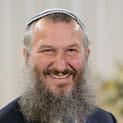
Some time ago a couple presented for fertility treatment, underwent an in-vitro fertilization, and an embryo was trans ferred to the wife. The couple received the highly anticipated good news that the treatment was successful and they were expecting a child.
The pregnancy proceeded as normal and the couple were extremely excited as they approached the due date. They imagined holding their very own daughter, watching her brought into this world, going through childhood and adolescence, becoming a young woman, graduating high school and college. The hopes and dreams of all expecting parents.
Quite late in the pregnancy a sus pected congenital defect was observed in the heart. The parents were advised to undergo an amniocentesis, in which a sample of the fluid in the amniotic sac, where the fetus develops, is removed and analyzed. The test was performed, and a very exact and in-depth genetic analysis was carried out.
The results came back that the girl was genetically healthy, but there was an
unforeseen result that would shake the parents, the hospital and many others. The girl was not theirs!! Apparently, there had been a tragic mistake on the day of the embryo transfer, and, instead of transferring their embryo, the woman has been implanted with another couple’s embryo.
The doctors immediately went back into their records to discover who were the genetic parents of the rapidly growing fetus. The check seemed to point conclu sively to another couple who underwent treatment at the same time.
This situation raised huge ethical ques tions, who were the parents of the child, the woman who supplied the genetic mate rial or the woman who carried the baby? This is not a new question; all cases of egg donation or gestational carriers, in which one woman supplies the egg and another woman carries the baby and delivers the child, raise the question of the definition of motherhood.
What makes this case somewhat unique is that the embryo was transferred without consent of either of the women. In a case of egg donation both women have agreed to the scenario prior to embarking on treatment. Often a legal contract has been signed before treatment and so the ques tion of motherhood was ideally already discussed and determined. But not in the case of this mistake.
More on this next time.
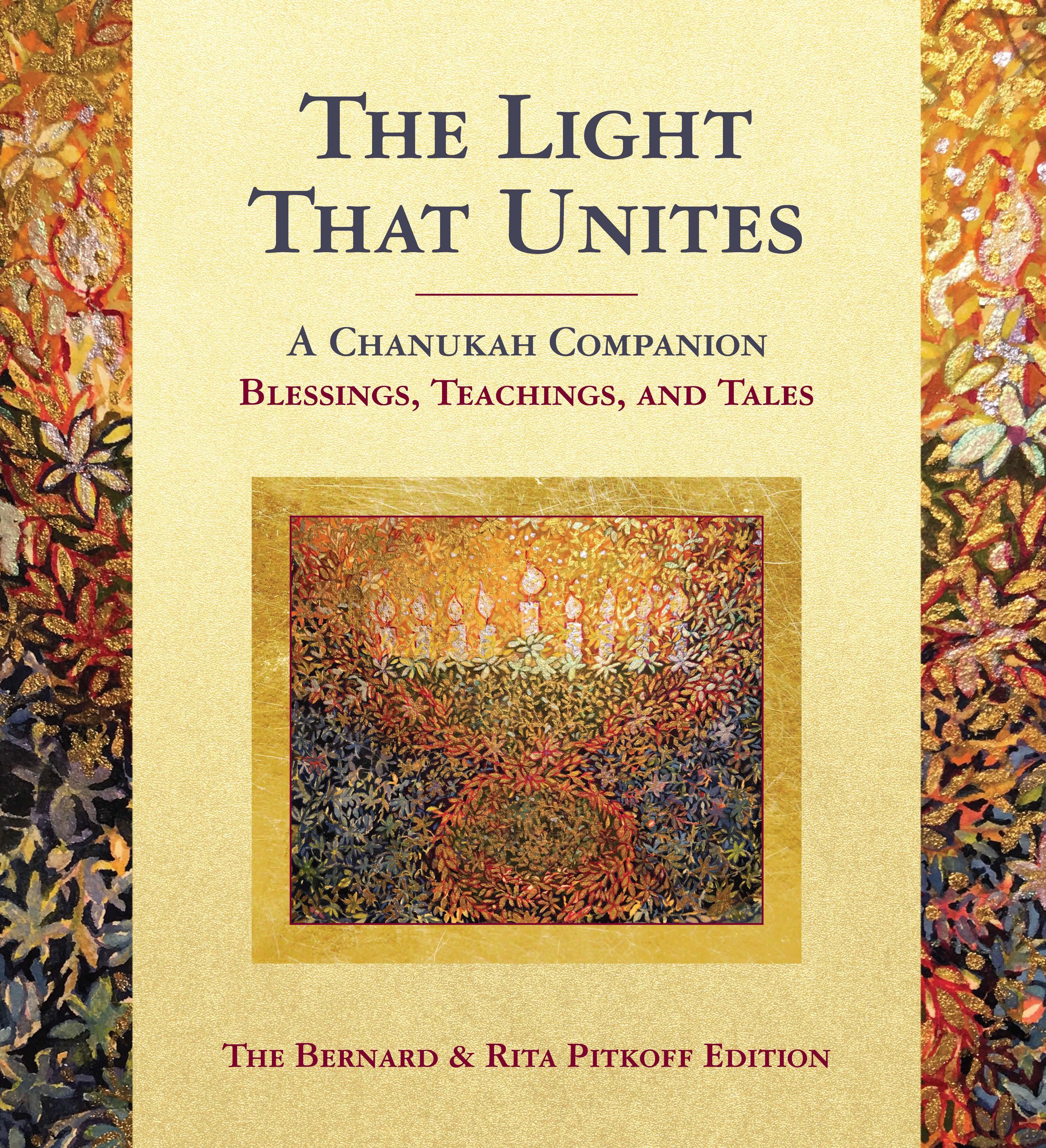
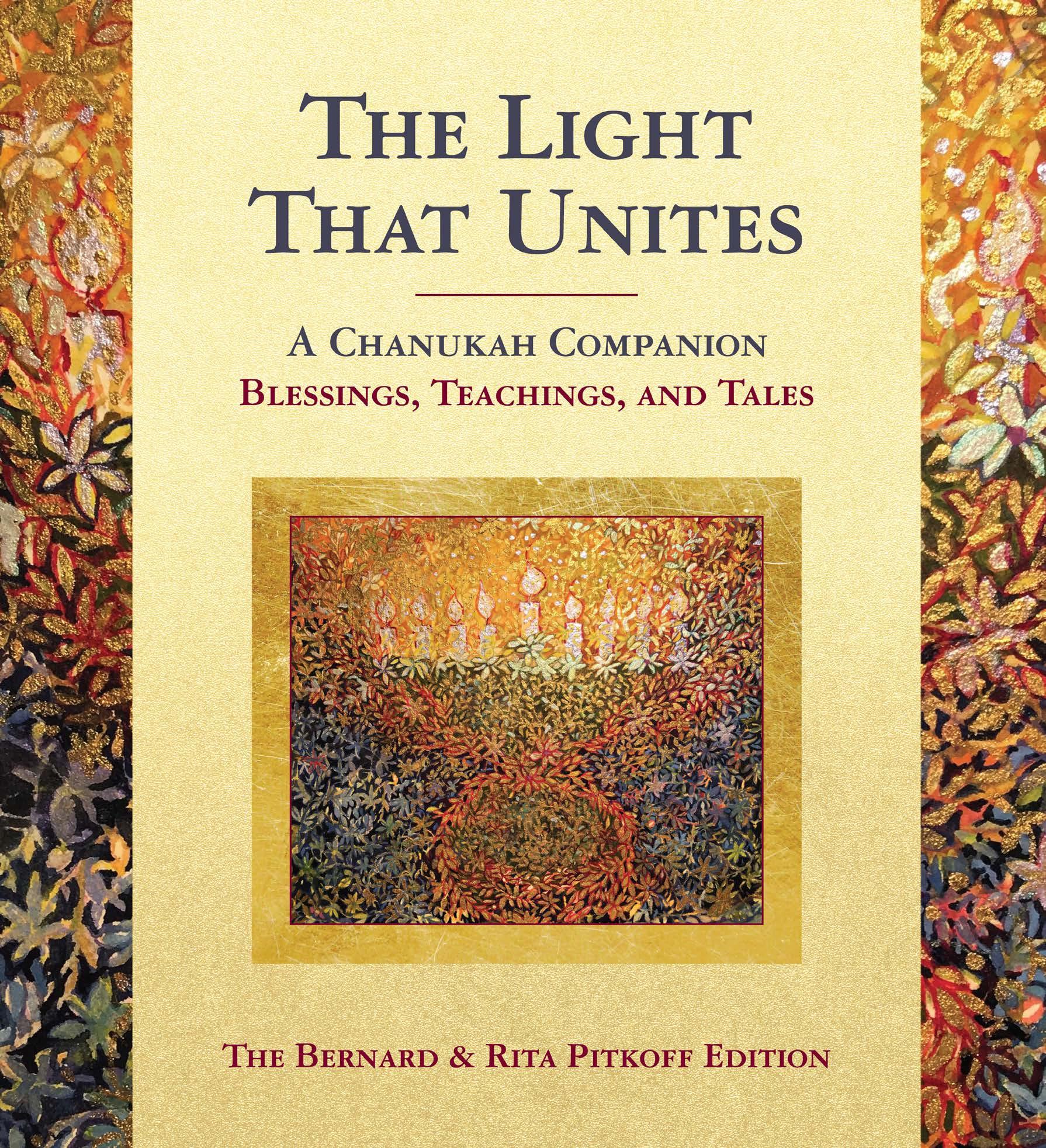
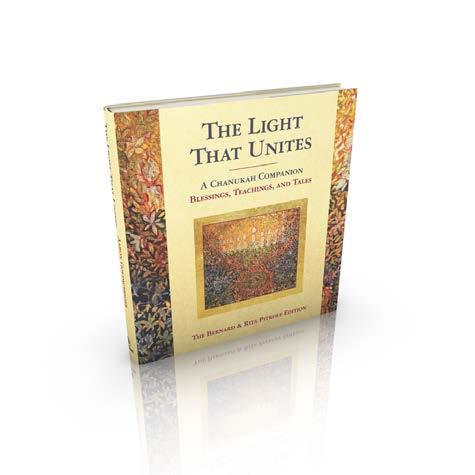



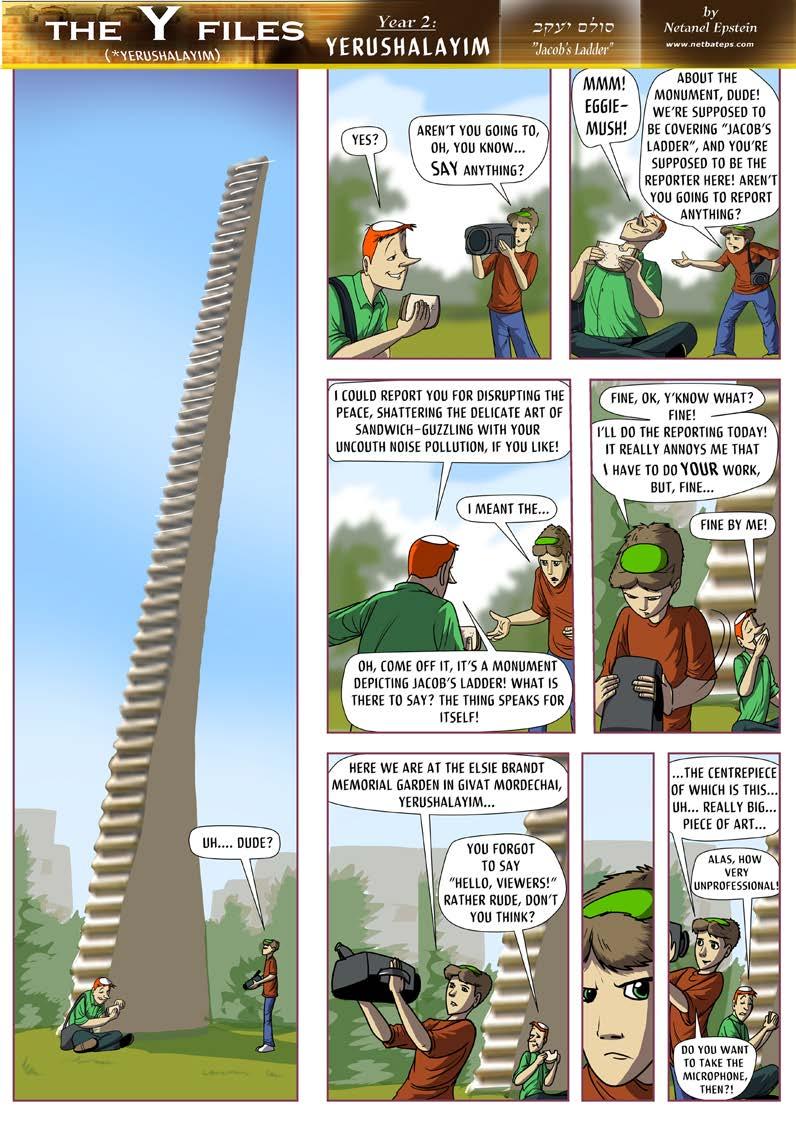
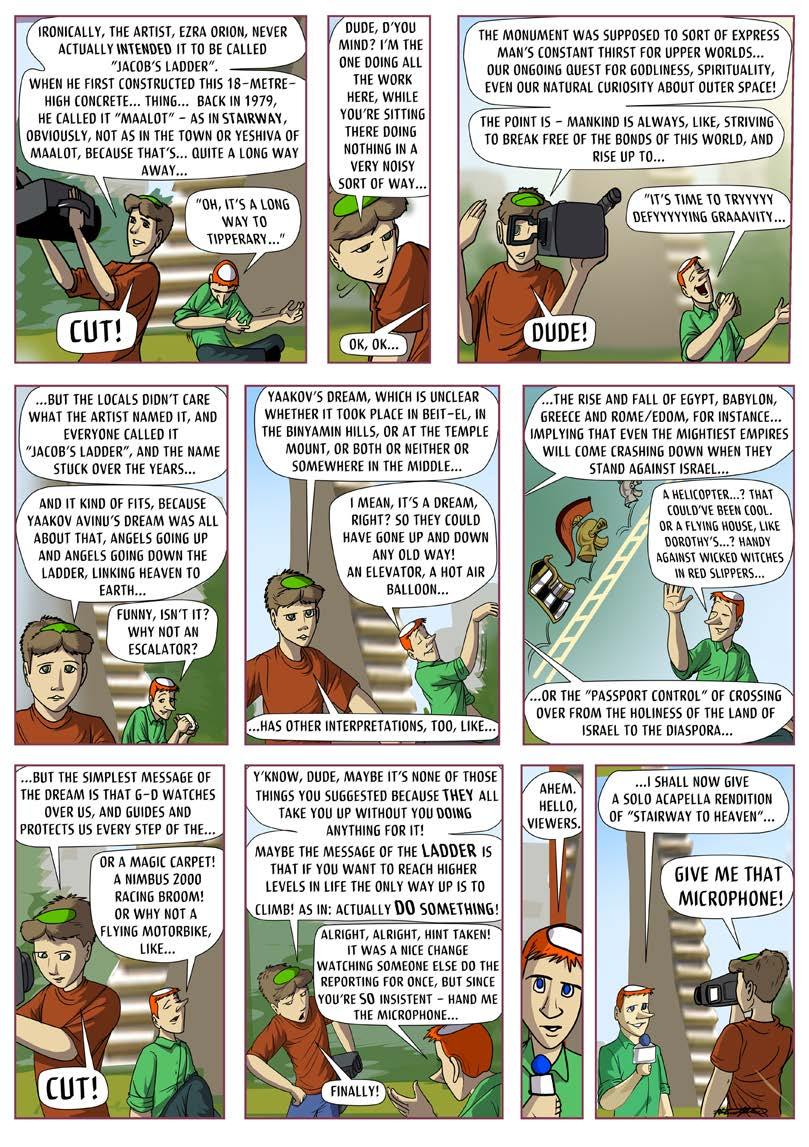



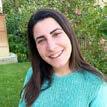
In this week’s Parsha of Vayeitzei, Yaakov leaves his hometown of Beer Sheva and heads to Charan. It says in the second pasuk that “And he arrived at the place and lodged there because the sun had set, and he took some of the stones of the place and placed [them] at his head, and he lay down in that place” and after his evening he “arose early in the morning, and he took the stone that he had placed at his head, and he set it up as a monument, and he poured oil on top of it”. This can teach us a valuable lesson about how Yaakov is as a person and his response to being zeal and not being lazy.
Had Yaakov continued on his journey after the sun set, he would not have been able to rise early the next day to keep mov ing toward his destination. When someone is lazy, it distances the person from allow ing them to reach their full potential and truly work on themselves. They are going to believe that they are content with the way that they are and will not want to bring change to move themselves forward.
Yaakov stopped once the sun set because he knew that he needed the rest so that he could arise early the next day and keep
moving. Being filled with alacrity is a trait that I have pushed myself to work on tremendously. Coming from a secular back ground, if I wanted to grow in any direction to live a Torah based life, I could not be lazy.
My zeal is what pushed me to spend my 17th birthday in the exact way that I wanted to, keeping Shabbat. It is also exactly what I needed to be able to spend a gap year in Israel because without it, I would not have had the strength to raise all of the funds to make it possible. Had I been lazy, the sec ond it got difficult, I would have given up the hope to live a Torah based lifestyle and continue on the path that my family has set out for me. Instead, I used my actions and the zeal that I had to push myself and excel.
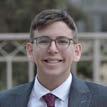
Yaakov truly embodies what it means to constantly be growing and working on our selves so that we can fight our desire to be lazy.
We all know the story of Yakov dreaming of the angels going up and down the ladder.
Rashi explains that since Yakov was leav ing Israel, the angels were ‘changing the guard.’ The ‘Eretz Yisrael angels’ left and the ‘Chutz L’aretz angels’ came down. Why would the angels be changing now, Yakov is still in the middle of Israel? Shouldn’t that happen as he crosses the border?









There is a profound message here. It is not about where you are, but in what direction you are headed. Yaakov is planning to leave Eretz Yisrael, therefore the angels change right away, while he is still in Israel. The same should be true the other way around. No matter where we find ourselves, if we decide to start going in a better direction, the “angles will change” and Hashem will help us reach and accomplish our goals.



Sometimes in life when we want to make a change or accomplish something, we stress and get in over our heads. We cannot see the end, so we do not even take the first step. Sometimes you just need to relax, start the journey, and know that Hashem is with you.
NCSY Israel is the premier organization in Israel, dedicated to connect, inspire, empower teen olim to the Land of Israel by encouraging pas sionate Judaism through Torah and Tradition. Find out more at israel.ncsy.org
Uri


Amiram Ben-Uliel, has been held in solitary confinement for seven years for a crime that we believe he did not commit. The ONLY evidence connecting him to the crime is his torture-based confessions.
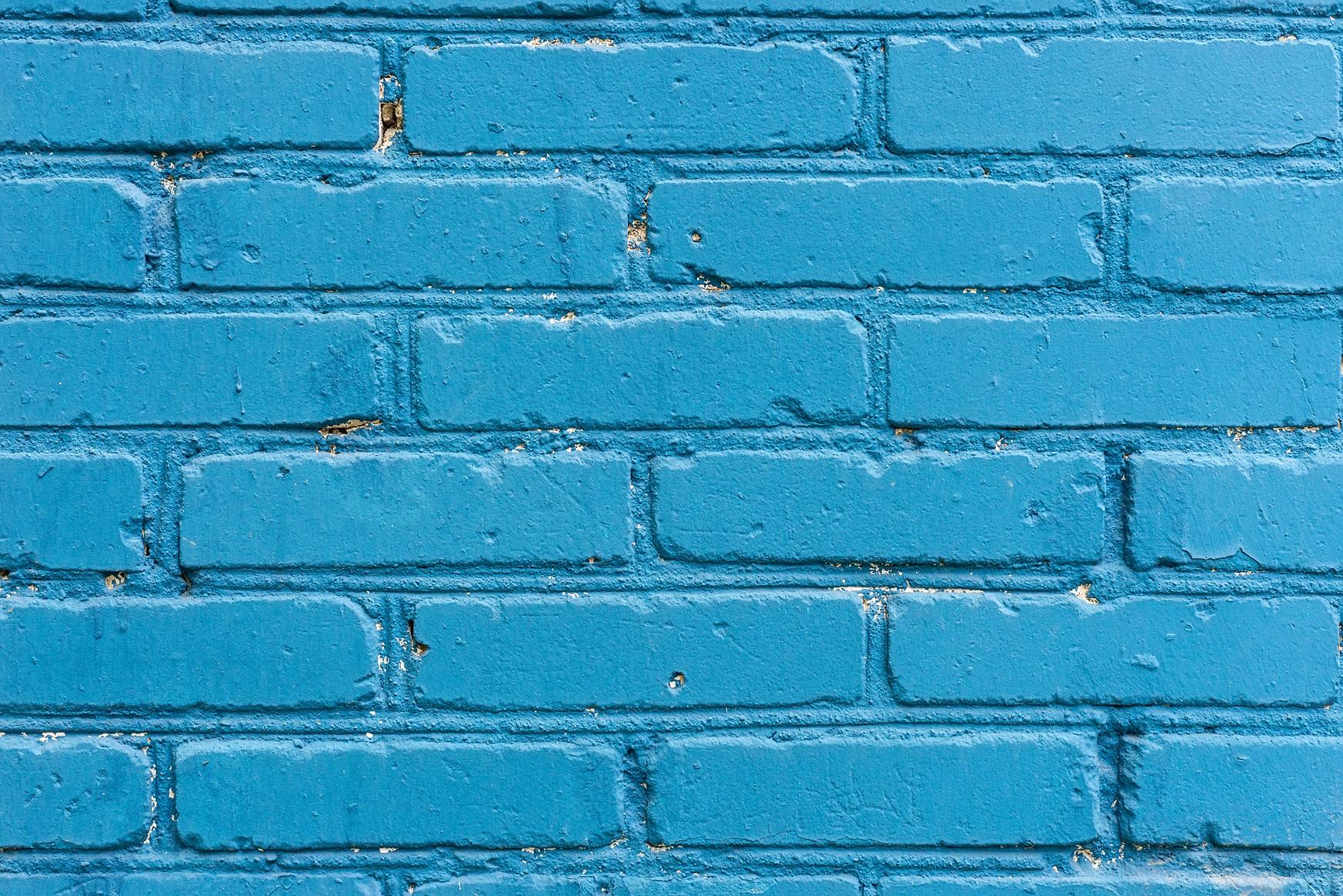



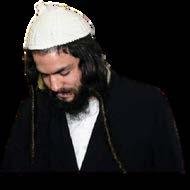
Abu-Tor (Ein Rogel) -walking distance to Kotel, 4 rooms, 235m, brand new luxurious penthouse, roof terrace, underground parking, storage, privacy, elevator, panoramic view. Exclusive! Galila: 053-9345985
CITY CENTER- Across from the Yeshurun Synagogue & short walk to Great Synagogue. 2 rooms, well-planned, elevator, parking, airconditioning, suitable for Airbnb property, Area is designated for Urban Renewal. Immediate occupancy. Exclusive! Ze'ev: 053-5212207
Old Katamon (Palmach)- 3 rooms, charming, pleasant, well-maintained, 2 Sukkah balconies, prime location! Exclusive! Tovi: 053-6268110

Only 4 apartments in the building Duplex garden: 237 sqm + 77 sqm garden Triplex garden: 260 sqm + 130 sqm garden Duplex PH: 350sqm + large terrace with spectacular views Large 2 Bedroom Apartment: 118 sqm + 34 sqm balcony

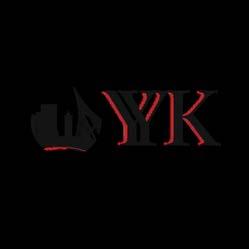
Large 3 bedrooms, 120 sqm 2.5 baths, Fully furnished (furniture can be removed) Wheelchair accessible Shabbat elevator Private parking (2) Immediate occupancy

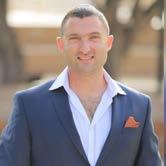







Private underground parking & storage , Shabbat elevator High-end specs, Occupancy: less than a year
Private entrance, 4 bedrooms, Family room, Dining room and Living room 4 full bathrooms and a laundry room, 2 nice size terraces Covered parking spot and a storage room, Private land 210 sqm of indoor space + 60 sqm of outdoor space





